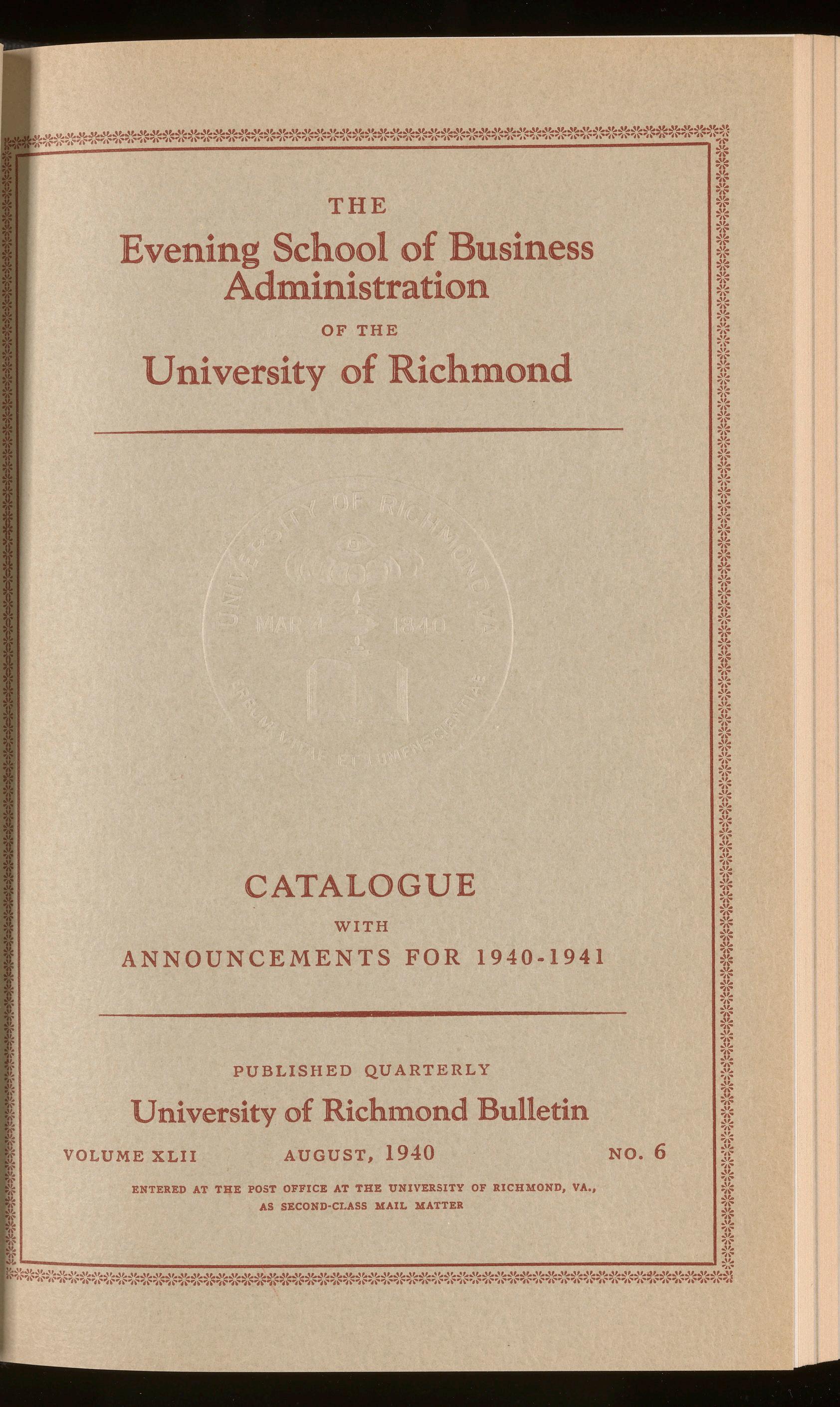
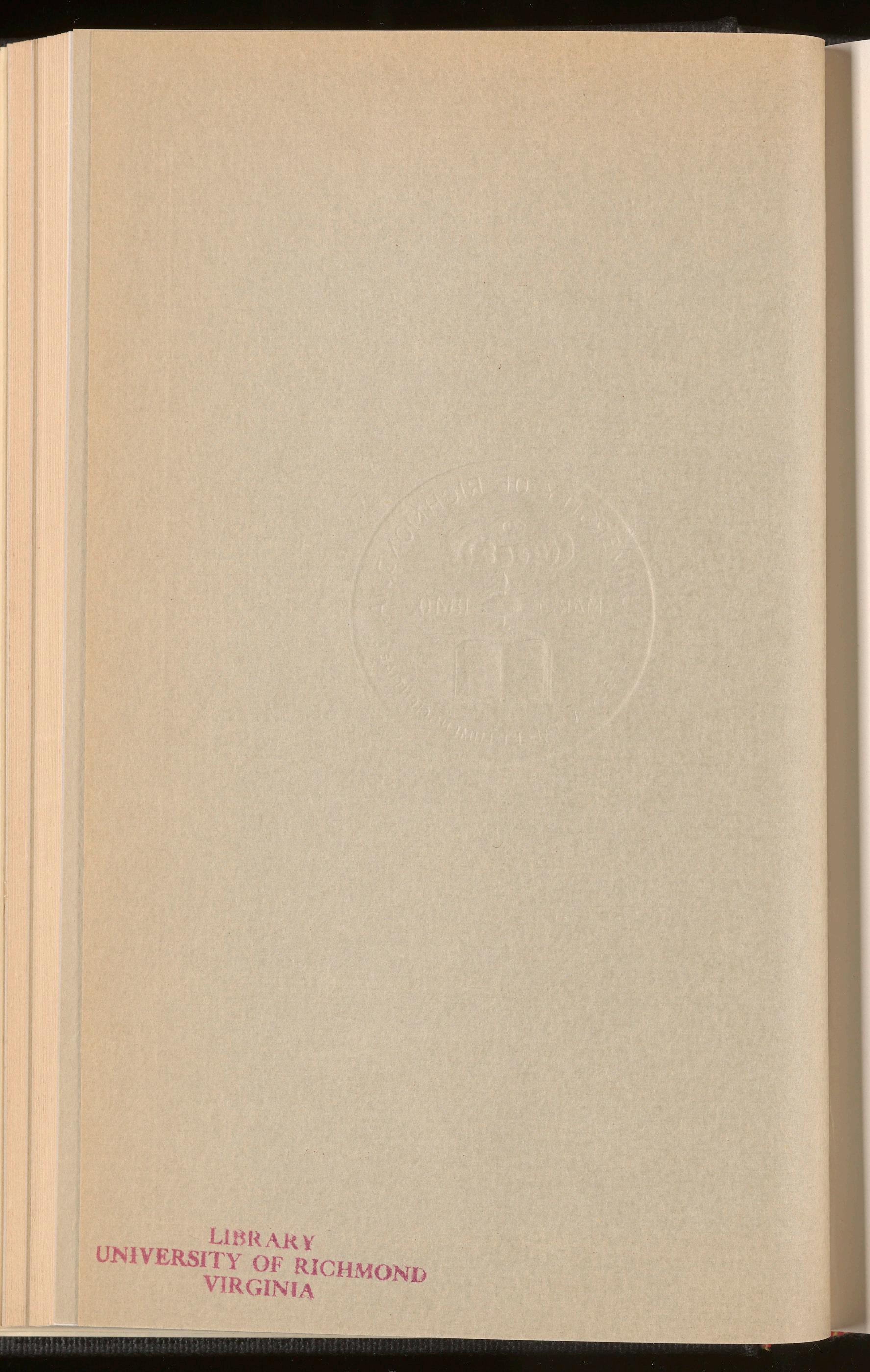

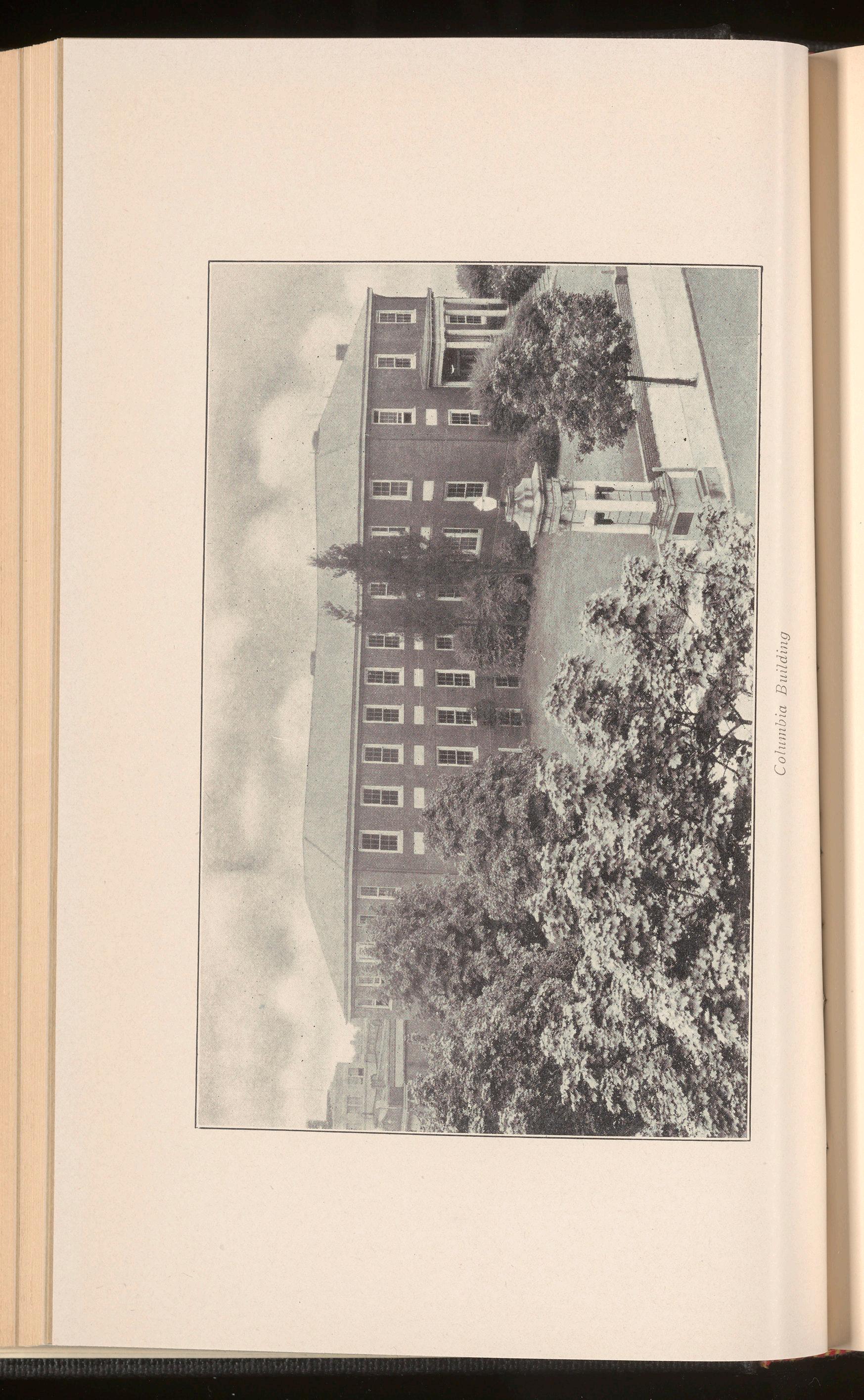





WITH ANNOUNCEMENTS FOR 1940-1941
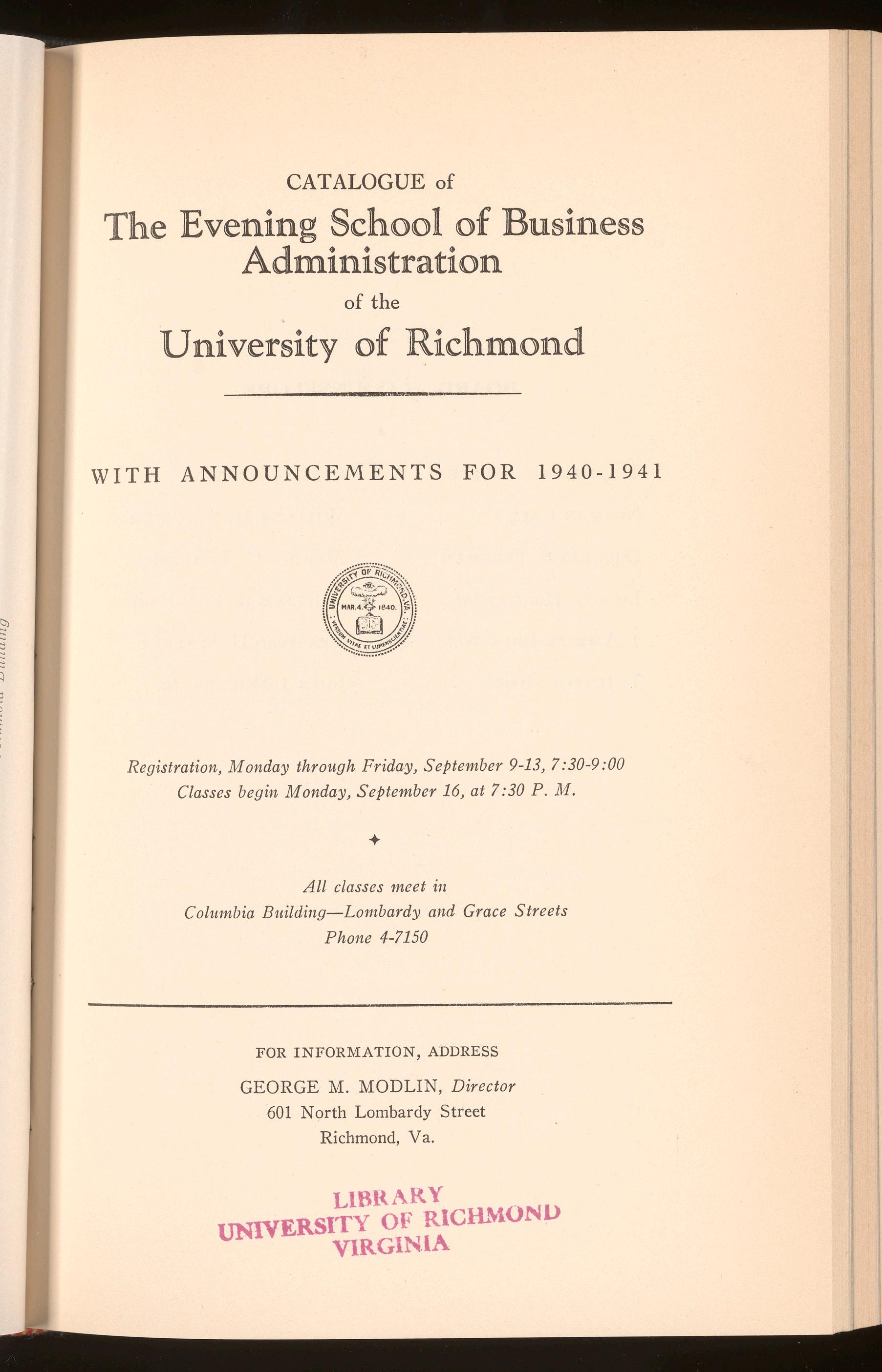
Registration, Monday through Friday, September 9-13, 7: 30-9 :00 Classes begin Monday, September 16, at 7:30 P. 11-1.
All classes meet in Columbia Building-Lombardy and Grace Streets Phone 4-7150
FOR INFORMATION, ADDRESS
GEORGE M. MODLIN, Director 601 North Lombardy Street Richmond, Va.
LIBRARY
UNIVERSITY OF RICl-L\lONl> VIRGINIA
T COLEMAN ANDREWS
NORMAN CALL
DOUGLAS s. FREEMAN
]ACK G. HOLTZCLAW
]. AMBLER JOHNSTON
T JUSTIN MOORE
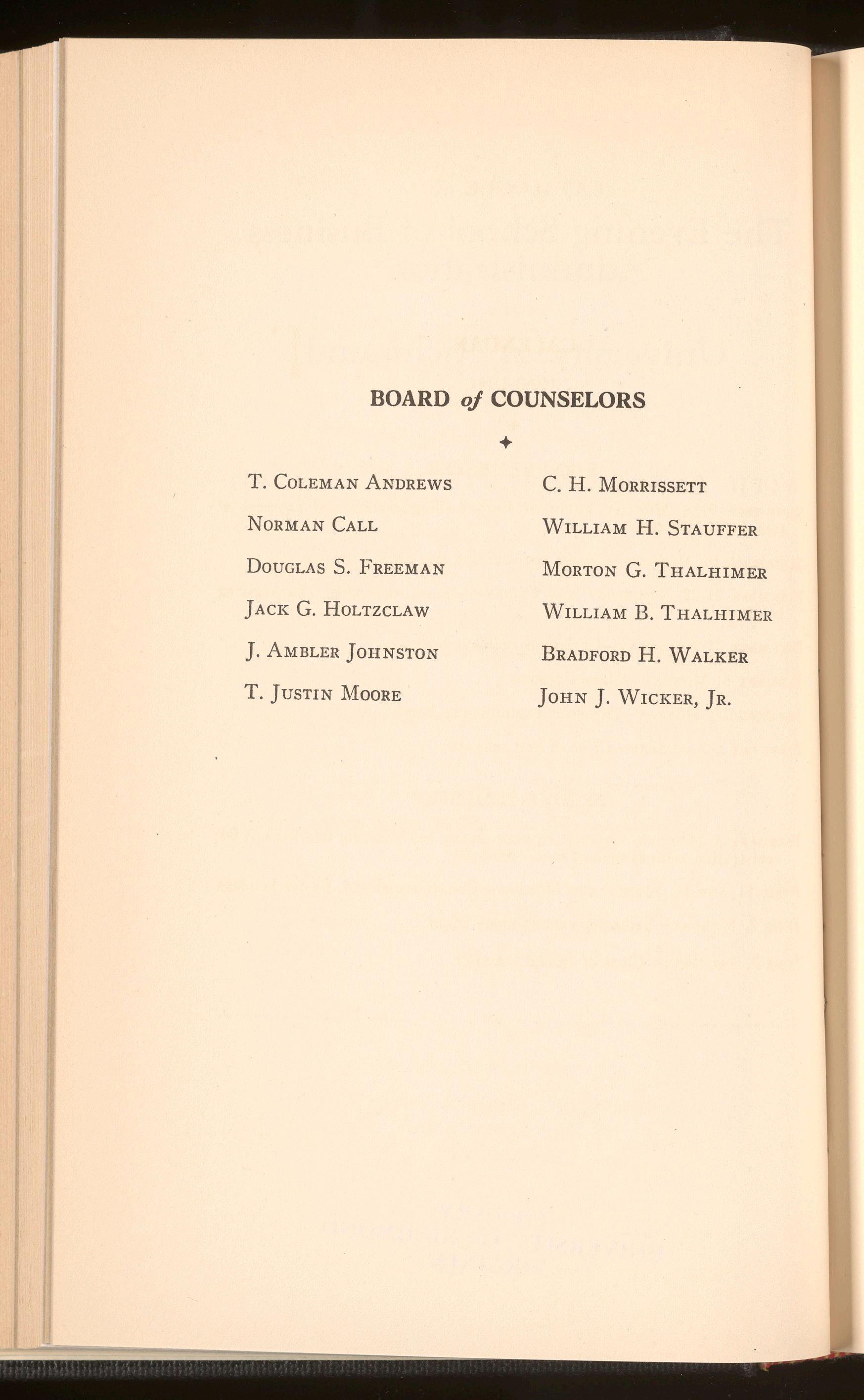
C.H. MoRRISSETT
WILLIAM H. STAUFFER
MORTON G. THALHIMER
WILLIAM B. THALHIMER
BRADFORD H. w ALKER
JOHN] WICKER, JR.
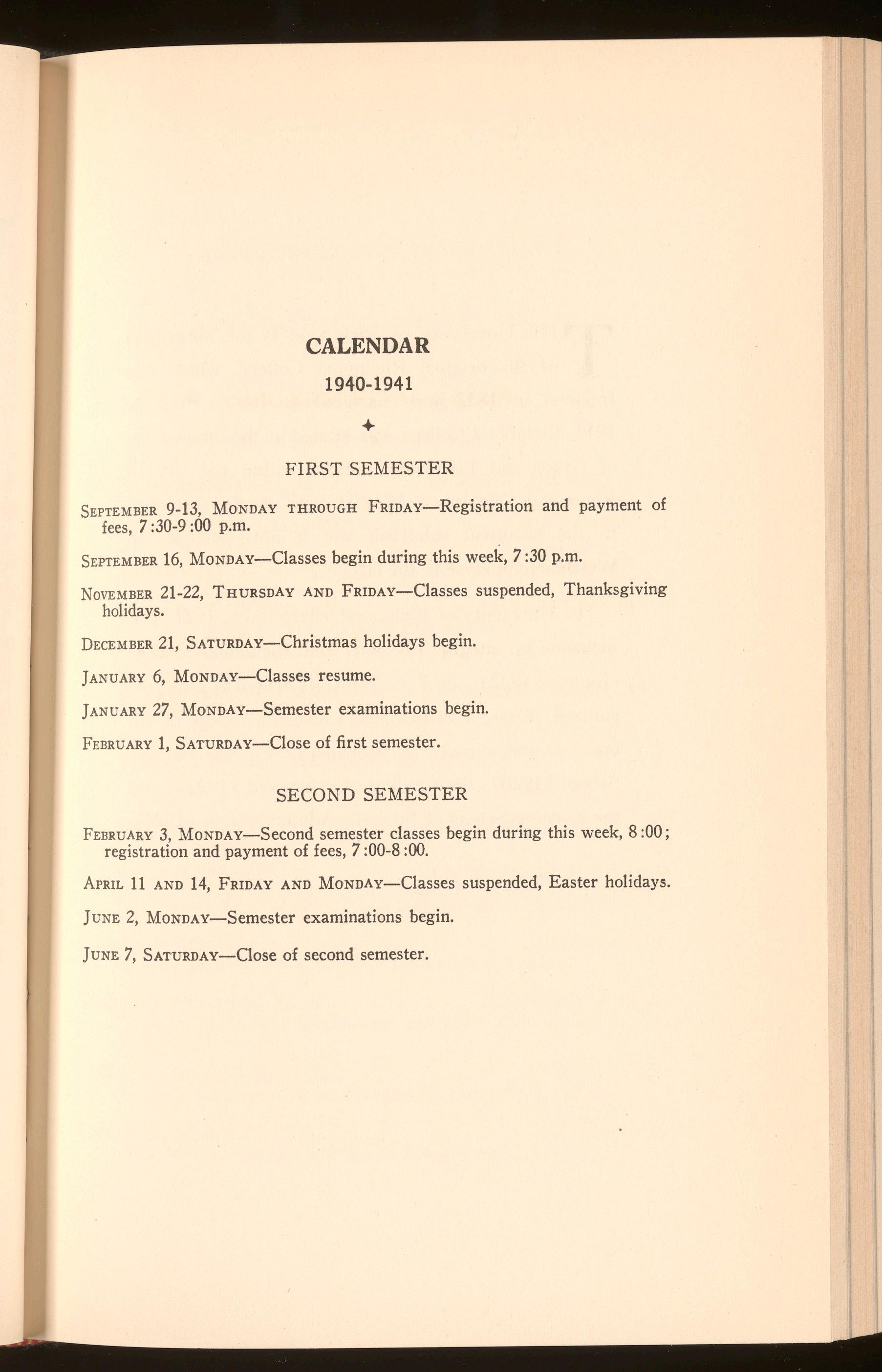
SEPTEMBER9-13, MoNDAYTHROUGHFRIDAY-Registration and payment of fees, 7 :30-9 :00 p.m.
SEPTEMBER 16, MoNDAY-Classes begin during this week, 7 :30 p.m.
NoVEMBER21-22, THURSDAYANDFRIDAY-Classes suspended, Thanksgiving holidays.
DECEMBER 21, SATURDAY-Christmas holidays begin.
JANUARY6, MONDAY-Classes resume.
JANUARY27, MONDAY-Semester examinations begin.
FEBRUARY 1, SATURDAY-Closeof first semester.
FEBRUARY 3, MoNDAY-Second semester classes begin during this week, 8 :00; registration and payment of fees, 7 :00-8 :00.
APRIL11 AND14, FRIDAYANDMONDAY-Classes suspended, Easter holidays.
JUNE2, MONDAY-Semester examinations begin.
JUNE7, SATURDAY-Closeof second semester.
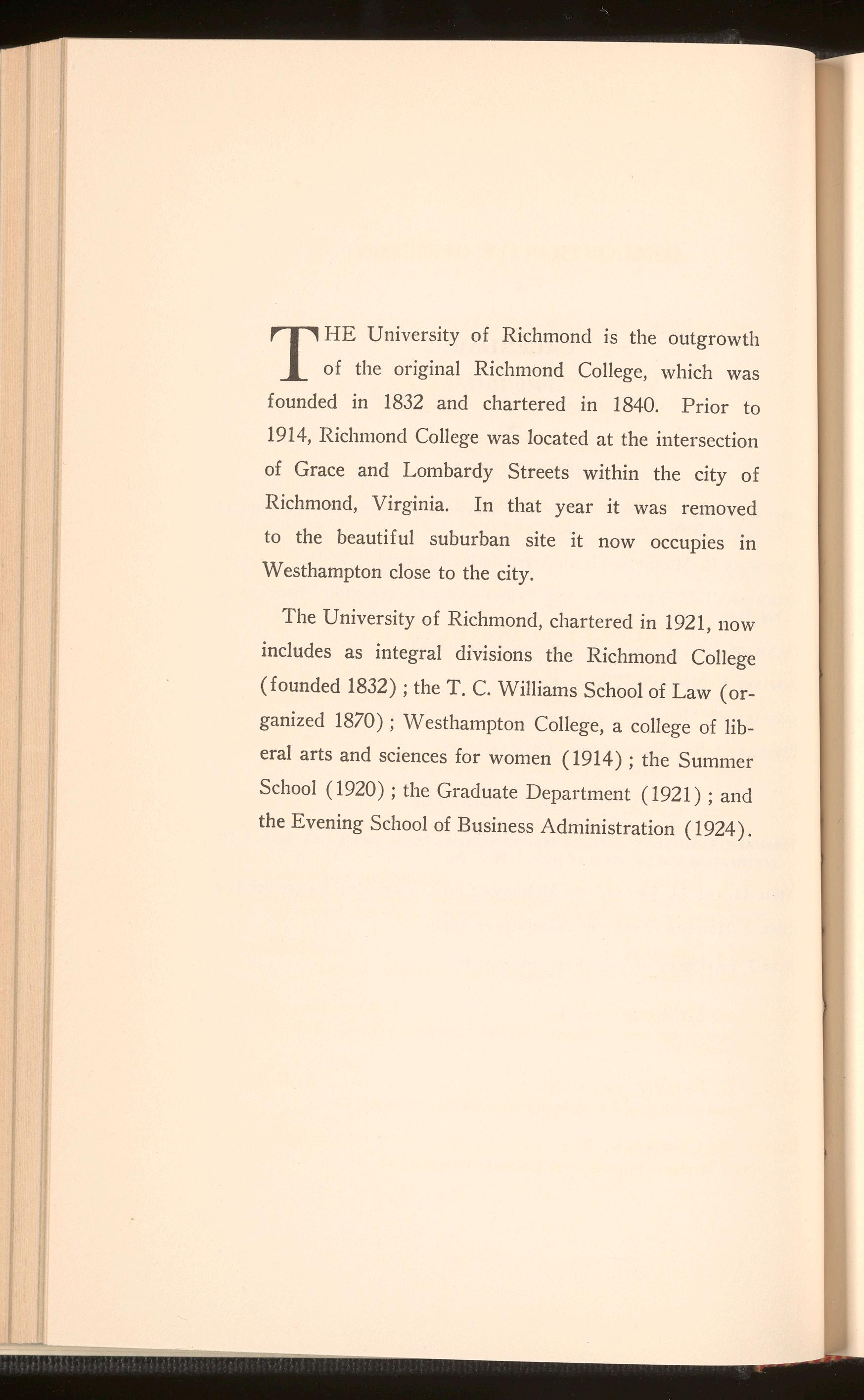
THE University of Richmond is the outgrowth of the original Richmond College, which was founded in 1832 and chartered in 1840. Prior to 1914, Richmond College was located at the intersection of Grace and Lombardy Streets within the city of Richmond, Virginia. In that year it was removed to the beautiful suburban site it now occupies in Westhampton close to the city.
The University of Richmond, chartered in 1921, now includes as integral divisions the Richmond College ( founded 1832) ; the T. C. Williams School of Law ( organized 1870); Westhampton College, a college of liberal arts and sciences for women ( 1914) ; the Summer School ( 1920) ; the Graduate Department ( 1921) ; and the Evening School of Business Administration ( 1924).
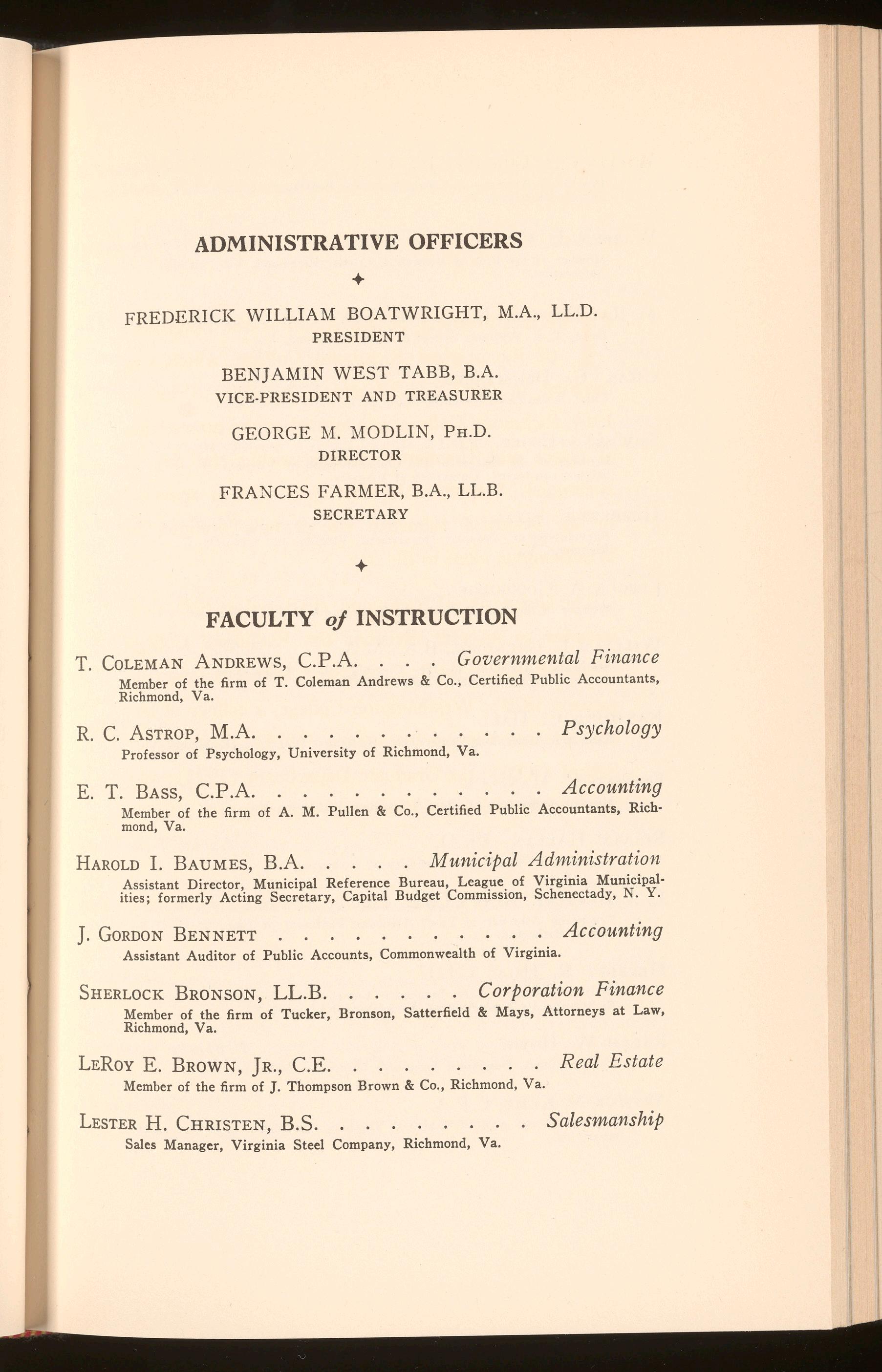
FREDERICK WILLIAM BOATWRIGHT, M.A., LL.D. PRESIDENT
BENJAMIN WEST TABB, B.A . VICE-PRESIDENT AND TREASURER
GEORGE M. MODLIN, PH D. DIRECTOR
FRANCES FARMER, B.A., LL.B. SECRETARY
T. COLEMAN ANDREWS, C.P.A. Governmental Finance
Member of the firm of T Coleman Andrews & Co., Certified Public Accountants, Richmond, Va
R. C. AsTROP, M.A. Psychology
Professor of Psychology, University of Richmond, Va .
E T . BASS, C.P.A. Accounting
Member of the firm of A. M. Pullen & Co , Certified Public Accountants, Richmond, Va.
H AROLD I. BAUMES, B.A. Municipal Administration
Assistant Director, Municipal Reference Bureau, League of Virginia Municipal• it ies ; formerly Acting Secretary, Capital Budget Commission, Schenectady, N Y
J. GORDON BENNETT Accounting
Assistant Auditor of Public Accounts, Commonwealth of Virginia.
SHERLOCK BRONSON, LL.B. Corporation Finance
Member of the firm of Tucker, Bronson, Satterfield & Mays, Attorneys at Law, Richmond, Va.
LEROY E . BROWN, JR., C.E. Real Estate
Member of the firm of J. Thompson Brown & Co , Richmond, Va
LESTER H. CHRISTEN, B.S. Salesmanship
Sales Manager, Virginia Steel Company , Richmond, Va
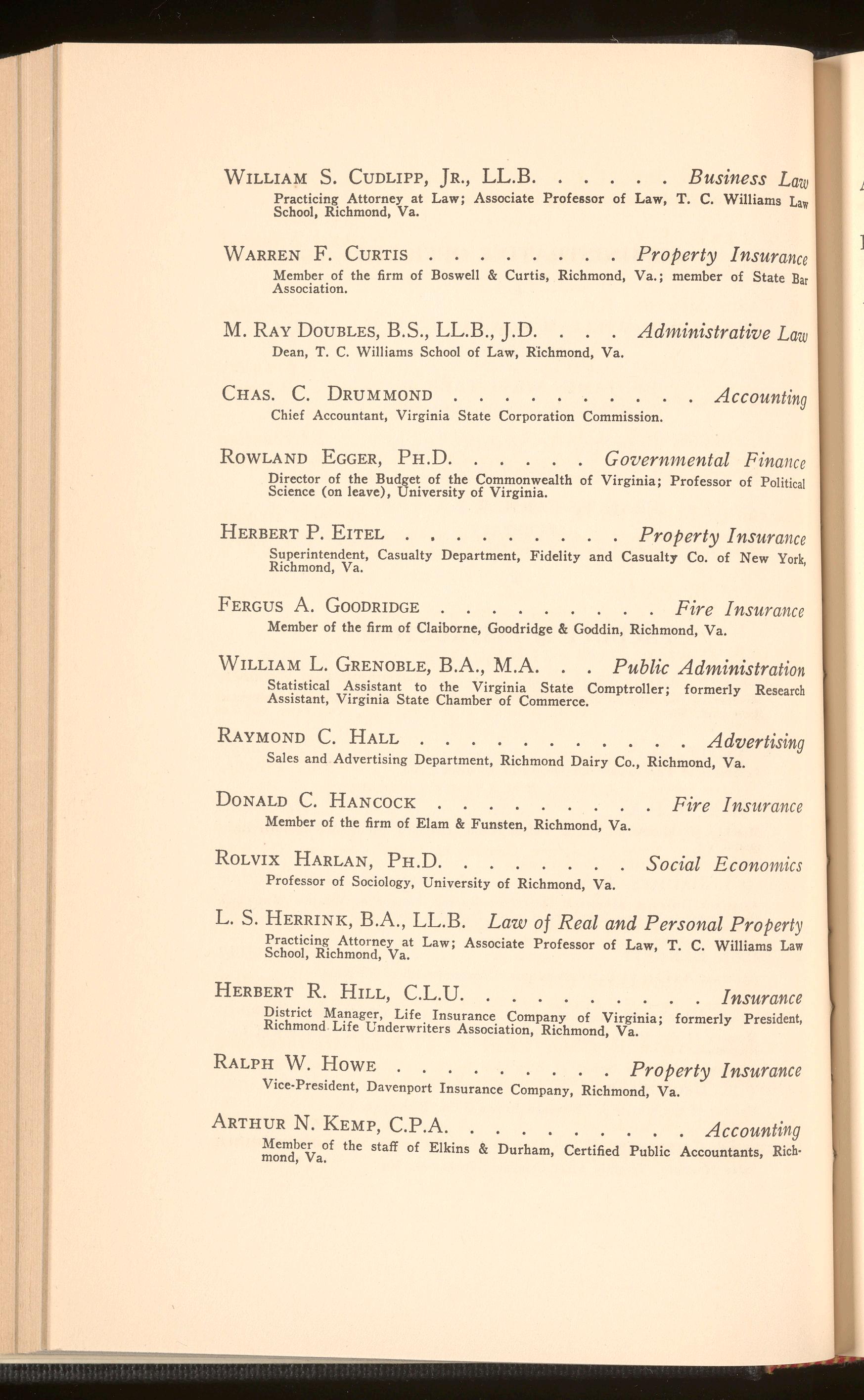
WILLIAM S. CuDLIPP, JR., LL.B. Business Law Practicing Attorney at Law; Associate Professor of Law, T. C. Williams Law School, Richmond, Va.
w ARREN F. CURTIS Property Insurance
Member of the firm of Boswell & Curtis, Richmond, Va.; member of State Bar Association.
M. RAY DOUBLES, B.S., LL.B., J.D. Administrative Law Dean, T. C. Williams School of Law, Richmond, Va.
CHAS. C. DRUMMOND Accounting Chief Accountant, Virginia State Corporation Commission,
ROWLAND EGGER, PH.D. Governmental Finance Director of the Budget of the Commonwealth of Virginia; Professor of Political Science (on leave), University of Virginia.
HERBERT P. EITEL Property Insurance Superintendent, Casualty Department, Fidelity and Casualty Co. of New York, Richmond, Va.
FERGUS A. GOODRIDGE Fire Insurance
Member of the firm of Claiborne, Goodridge & Goddin, Richmond, Va.
WILLIAM L. GRENOBLE, B.A., M.A. Public Administration Statistical Assistant to the Virginia State Comptroller; formerly Research Assistant, Virginia State Chamber of Commerce.
RAYMOND C. HALL Advertising Sales and Advertising Department, Richmond Dairy Co., Richmond, Va.
DONALD C. HANCOCK Fire Insurance
Member of the firm of Elam & Funsten, Richmond, Va.
ROLVIX HARLAN, PH.D. Social Economics Professor of Sociology, University of Richmond, Va.
L. S. HERRINK, B.A., LL.B. Law of Real and Personal Property Practicing Attorney at Law; Associate Professor of Law, T. C. Williams Law School, Richmond, Va.
HERBERT R. HILL, C.L.U. Insurance District Manager, Life Insurance Company of Virginia; formerly President, Richmond Life Underwriters Association, Richmond, Va.
RALPH W. HowE Property Insurance Vice-President, Davenport Insurance Company, Richmond, Va.
ARTHUR N. KEMP, C.P.A. Accounting Member of the staff of Elkins & Durham, Certified Public Accountants, Rich· mond, Va.
AUBREY KIDD, B.S., C.P.A.
Accounting Auditor, The Morris Plan Bank of Virginia.
P. B. LEWIS, B.A.
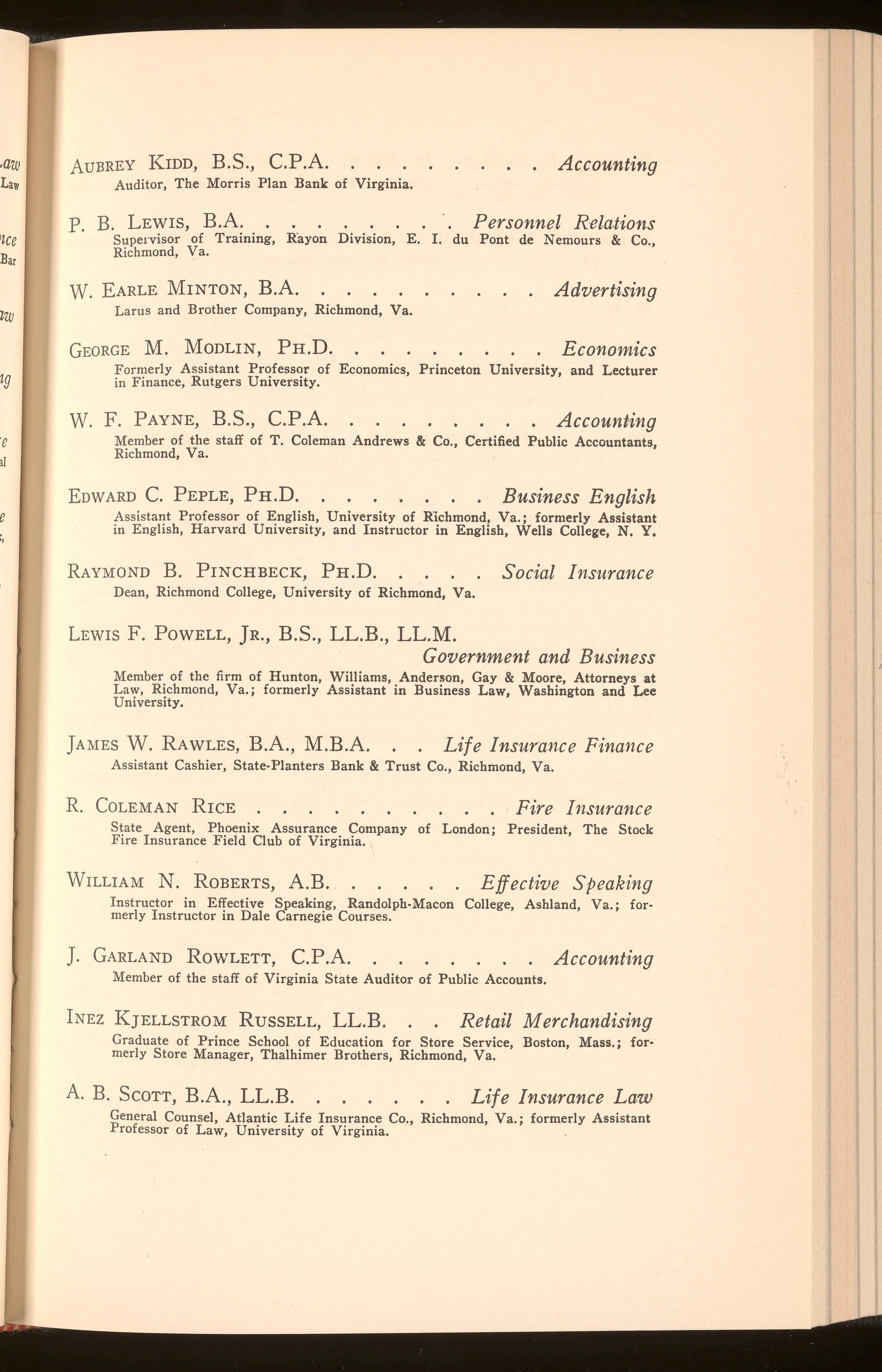
Personnel Relations
Supervisor of Training, Rayon Division, E. I. du Pont de Nemours & Co., Richmond, Va.
w. EARLE MINTON, B.A. Advertising Larus and Brother Company, Richmond, Va.
GEORGE M. MODLIN, PH.D. Economics
Formerly Assistant Professor of Economics, Princeton University, and Lecturer in Finance, Rutgers University.
W. F. PAYNE, B.S., C.P.A.
Accounting
Member of the staff of T. Coleman Andrews & Co., Certified Public Accountants, Richmond, Va.
EDWARD C. PEPLE, PH.D.
Business English
Assistant Professor of English, University of Richmond, Va.; formerly Assistant in English, Harvard University, and Instructor in English, Wells College, N. Y.
RAYMOND B. PINCHBECK, PH.D.
Dean, Richmond College, University of Richmond, Va.
LEWIS F. POWELL, JR., B.S., LL.B., LL.M.
Social Insurance
Government and Business
Member of the firm of Hunton, Williams, Anderson, Gay & Moore, Attorneys at Law, Richmond, Va.; formerly Assistant in Business Law, Washington and Lee University.
JAMES w. RAWLES, B.A., M.B.A. Life Insurance Finance
Assistant Cashier, State-Planters Bank & Trust Co., Richmond, Va.
R. COLEMAN RICE Fire Insurance
State Agent, Phoenix Assurance Company of London; President, The Stock Fire Insurance Field Club of Virginia.
WILLIAM N. ROBERTS, A.B. Effective Speaking
Instructor in Effective Speaking, Randolph-Macon College, Ashland, Va.; for• merly Instructor in Dale Carnegie Courses.
J. GARLAND ROWLETT, C.P.A. Accounting
Member of the staff of Virginia State Auditor of Public Accounts.
INEZ KJELLSTROM RUSSELL, LL.B. Retail Merchandising
Graduate of Prince School of Education for Store Service, Boston, Mass.; for• merly Store Manager, Thalhimer Brothers, Richmond, Va.
A. B. ScoTT, B.A., LL.B. Life Insurance Law
General Counsel, Atlantic Life Insurance Co., Richmond, Va.; formerly Assistant Professor of Law, University of Virginia.
STEPHEN H. SIMES, A.B., LL.B.
Government and Business Associated with the firm of Hunton, Williams, Anderson, Gay & Moore, Attorncy1 at Law, Richmond, Va.
J. GUTHRIE SMITH, M.A.I.
Real Estate Sales Manager, Windsor Farms, Inc., Richmond, Va.
MARSHALL C. SPEIGHT
Fire Insurance State Agent, Globe & Rutgers Fire Insurance Co., Richmond, Va.
A. FRANK STEWART, C.P.A.
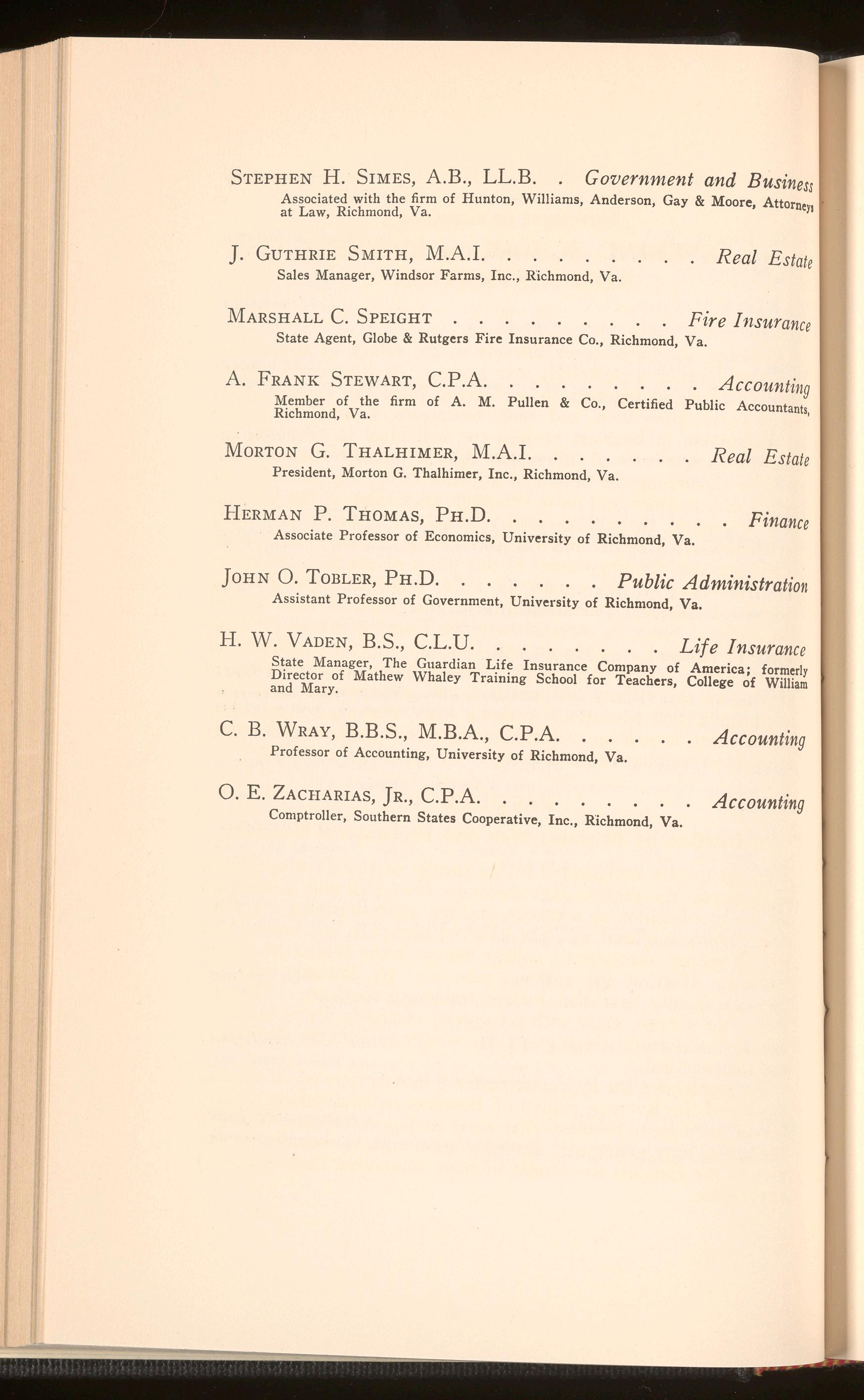
Accounting
Member of the firm of A. M. Pullen & Co., Certified Public Accountants, Richmond, Va.
MORTON G. THALHIMER, M.A.I. Real Estate President, Morton G. Thalhimer, Inc., Richmond, Va.
HERMAN P. THOMAS, PH.D.
Finance Associate Professor of Economics, University of Richmond, Va.
JOHN 0. TOBLER, PH.D.
Public Administration Assistant Professor of Government, University of Richmond, Va.
H. w. VADEN, B.S., C.L.U.
Life Insurance State Manager, The Guardian Life Insurance Company of America; formerly Director of Mathew Whaley Training School for Teachers, College of William and Mary.
C. B. WRAY, B.B.S., M.B.A., C.P.A.
Accounting Professor of Accounting, University of Richmond, Va.
0. E. ZACHARIAS, JR., C.P.A.
Accounting Comptroller, Southern States Cooperative, Inc., Richmond, Va.

Training for business exclusively in the school of experience, it is now clear, is a wastefully long process. It is generally agreed that by bringing together in systematic form the experience of many years, many men, and many businesses, a university course of instruction in business enables the individual to profit by the combined experience of others and thus to advance more rapidly. It is by shortening the period of apprenticeship, together with the giving of a broader and more thorough knowledge of the business field in general, that the university schools of business have made for themselves a secure place in the scheme of modern education. Recognizing the importance of this phase of practical education, the University of Richmond, in 1924, established the Evening School of Business Administration as the sixth division of the University. Since its establishment the Evening School of Business has enjoyed a steady growth from an original enrollment of 51 students. The purpose of the Evening School of Business is to provide an opportunity for industrial and governmental employees to continue their educational training while working and to obtain both a broad knowledge of the fundamentals of business and a more specialized training in the techniques of particular vocations.
Two groups are represented in the faculty of the Evening School of Business: the professional university instructor who is devoting his life to education as a career, and the active business executive or government official who has achieved success in his vocation and who is willing to conduct a college course in the field of his major interest. Most of the business men who are affiliated with the School's faculty have had former teaching experience. Through these two groups, each with its special emphasis, there results a balanced education which gives due weight to both the theoretical and the practical.
To supplement the instruction offered by members of the regular faculty of the Evening School of Business Administration a number of prominent business executives and government officials in Richmond have generously agreed to meet with various classes and give to the students the benefit of their specialized knowledge and experience.
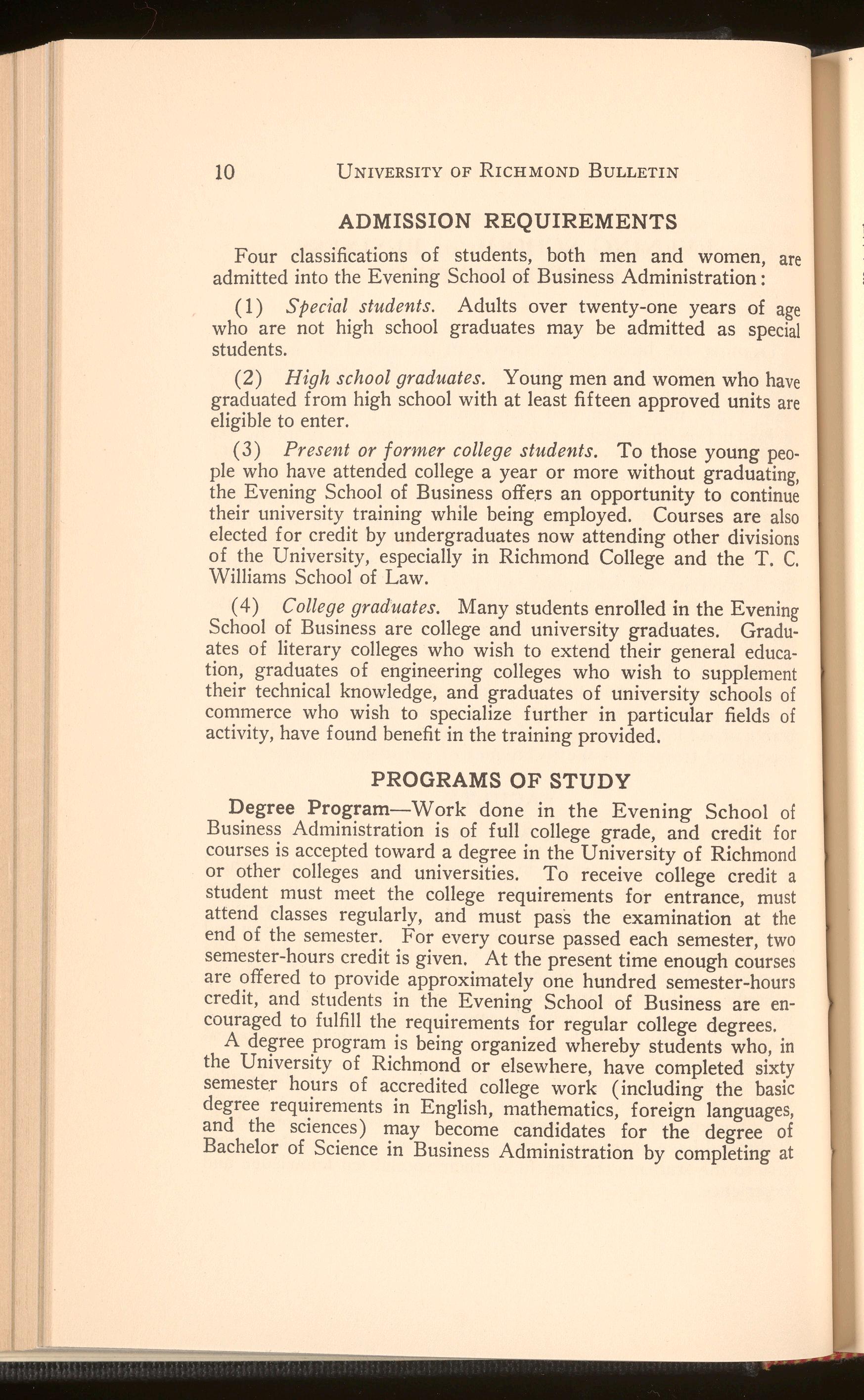
Four classifications of students, both men and women, are admitted into the Evening School of Business Administration:
( 1) Special students. Adults over twenty-one years of age who are not high school graduates may be admitted as special students.
(2) High school graduates. Young men and women who have graduated from high school with at least fifteen approved units are eligible to enter.
( 3) Present or former college students. To those young peo- ple who have attended college a year or more without graduating, the Evening School of Business offers an opportunity to continue their university training while being employed. Courses are also elected for credit by undergraduates now attending other divisions of the University, especially in Richmond College and the T. C. Williams School of Law.
( 4) College graduates. Many students enrolled in the Evening School of Business are college and university graduates. Gradu- ates of literary colleges who wish to extend their general educa- tion, graduates of engineering colleges who wish to supplement their technical knowledge, and graduates of university schools of commerce who wish to specialize further in particular fields of activity, have found benefit in the training provided.
Degree Program-Work done in the Evening School of Business Administration is of full college grade, and credit for courses is accepted toward a degree in the University of Richmond or other colleges and universities. To receive college credit a student must meet the college requirements for entrance, must attend classes regularly, and must pass the examination at the end of the semester. For every course passed each semester, two semester-hours credit is given. At the present time enough courses are offered to provide approximately one hundred semester-hours credit, and students in the Evening School of Business are en- couraged to fulfill the requirements for regular college degrees.
A degree program is being organized whereby students who, in the University of Richmond or elsewhere, have completed sixty semester hours of accredited college work ( including the basic degree requirements in English, mathematics, foreign languages, and the sciences) may become candidates for the degree of Bachelor of Science in Business Administration by completing at
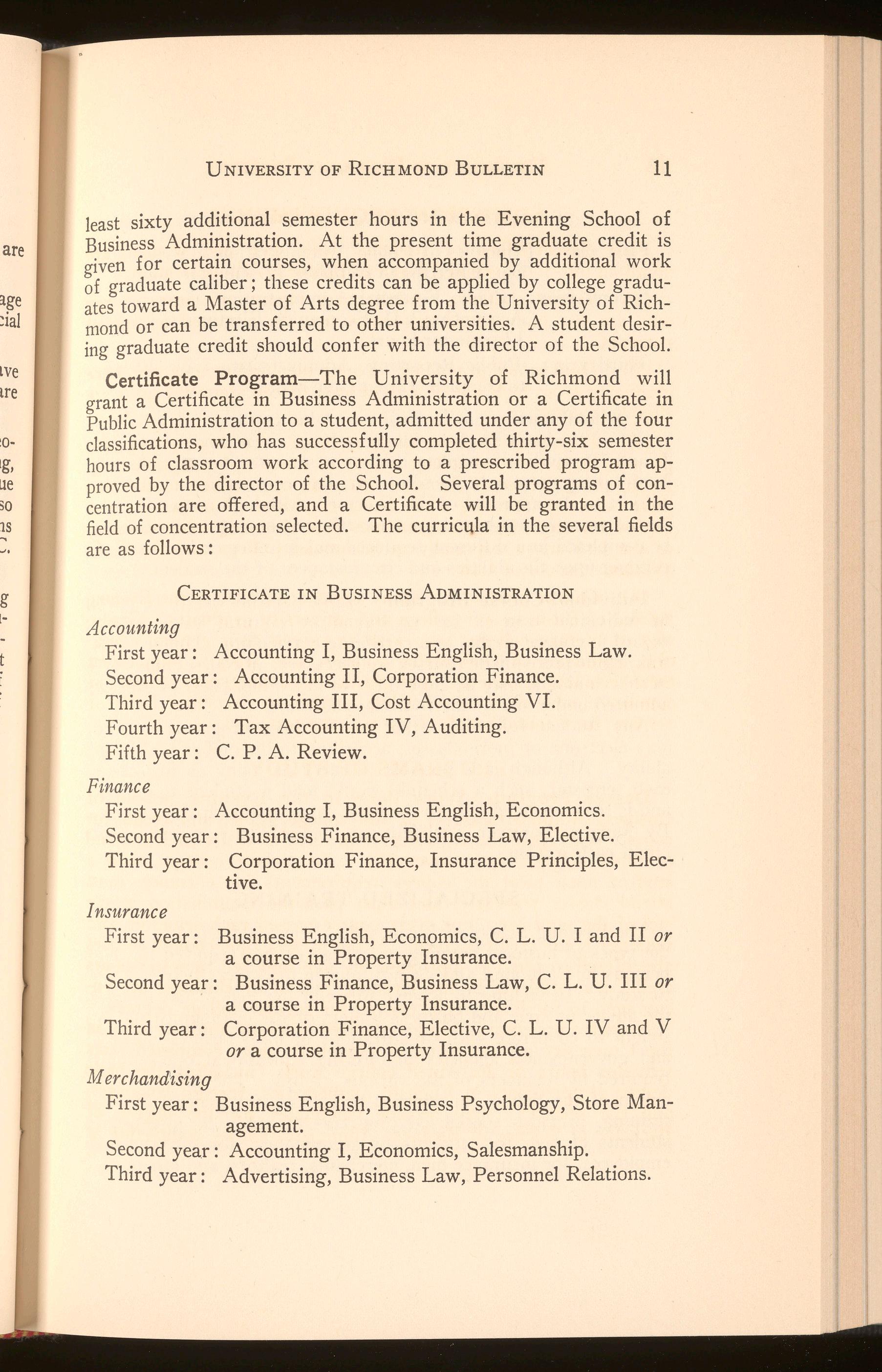
least sixty additional semester hours in the Evening School of Business Administration. At the present time graduate credit is given for certain courses, when accompanied by additional work of graduate caliber; these credits can be applied by college graduates toward a Master of Arts degree from the University of Richmond or can be transferred to other universities. A student desiring graduate credit should confer with the director of the School.
Certificate Program-The University of Richmond will grant a Certificate in Business Administration or a Certificate in Public Administration to a student, admitted under any of the four classifications, who has successfully completed thirty-six semester hours of classroom work according to a prescribed program approved by the director of the School. Several programs of concentration are offered, and a Certificate will be granted in the field of concentration selected. The curricula in the several fields are as follows
Accounting
First year: Accounting I, Business English, Business Law.
Second year: Accounting II, Corporation Finance.
Third year: Accounting III, Cost Accounting VI.
Fourth year: Tax Accounting IV, Auditing.
Fifth year: C. P.A. Review.
Finance
First year: Accounting I, Business English, Economics.
Second year: Business Finance, Business Law, Elective.
Third year: Corporation Finance, Insurance Principles, Elective.
Insurance
First year: Business English, Economics, C. L. U. I and II or a course in Property Insurance.
Second year: Business Finance, Business Law, C. L. U. III or a course in Property Insurance.
Third year: Corporation Finance, Elective, C. L. U. IV and V or a course in Property Insurance.
Merchandising
First year: Business English, Business Psychology, Store Management.
Second year: Accounting I, Economics, Salesmanship.
Third year: Advertising, Business Law, Personnel Relations.
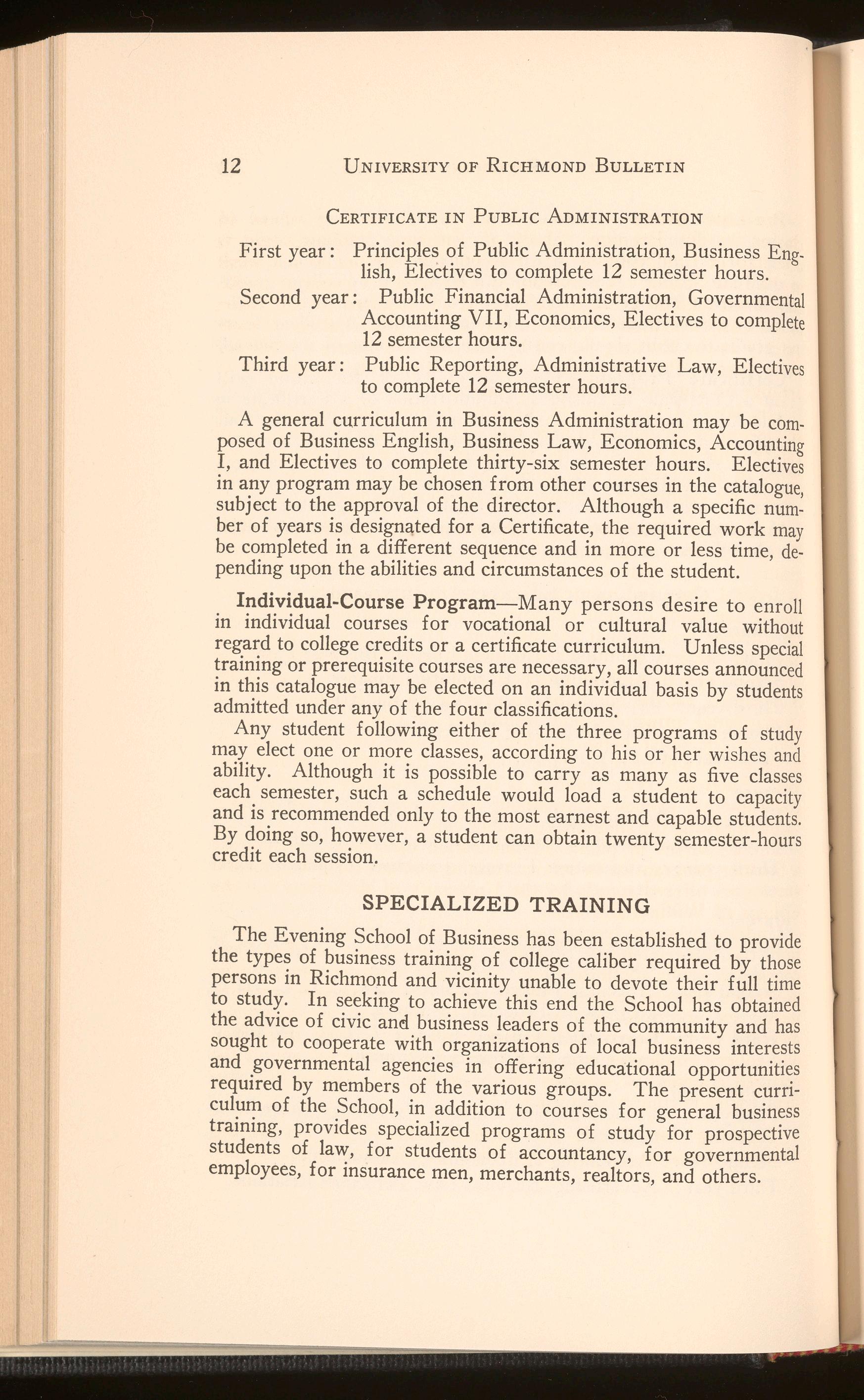
CERTIFICATE IN PUBLIC ADMINISTRATION
First year: Principles of Public Administration, Business Eng- lish, Electives to complete 12 semester hours.
Second year: Public Financial Administration, Governmental Accounting VII, Economics, Electives to complete 12 semester hours.
Third year: Public Reporting, Administrative Law, Electives to complete 12 semester hours.
A general curriculum in Business Administration may be com- posed of Business English, Business Law, Economics, Accounting I, and Electives to complete thirty-six semester h~mrs. Electives in any program may be chosen from other courses m the catalogue, subject to the approval of the director. Although a specific num- ber of years is designated for a Certificate, the required work may be completed in a different sequence and in more or less time, de- pending upon the abilities and circumstances of the student.
Individual-Course Program-Many persons desire to enroll in individual courses for vocational or cultural value without regard to college credits or a certificate curriculum. Unless special training or prerequisite courses are necessary, all courses announced in this catalogue may be elected on an individual basis by students admitted under any of the four classifications.
Any student following either of the three programs of study may elect one or more classes, according to his or her wishes and ability. Although it is possible to carry as many as five classes each semester, such a schedule would load a student to capacity and is recommended only to the most earnest and capable students. By doing so, however, a student can obtain twenty semester-hours credit each session.
The Evening School of Business has been established to provide the types of business training of college caliber required by those persons in Richmond and vicinity unable to devote their full time to study. In seeking to achieve this end the School has obtained the advice of civic and business leaders of the community and has sought to cooperate with organizations of local business interests and governmental agencies in offering educational opportunities required by members of the various groups. The present curri- culum of the School, in addition to courses for general business training, provides specialized programs of study for prospective students of law, for students of accountancy, for governmental employees, for insurance men, merchants, realtors, and others.
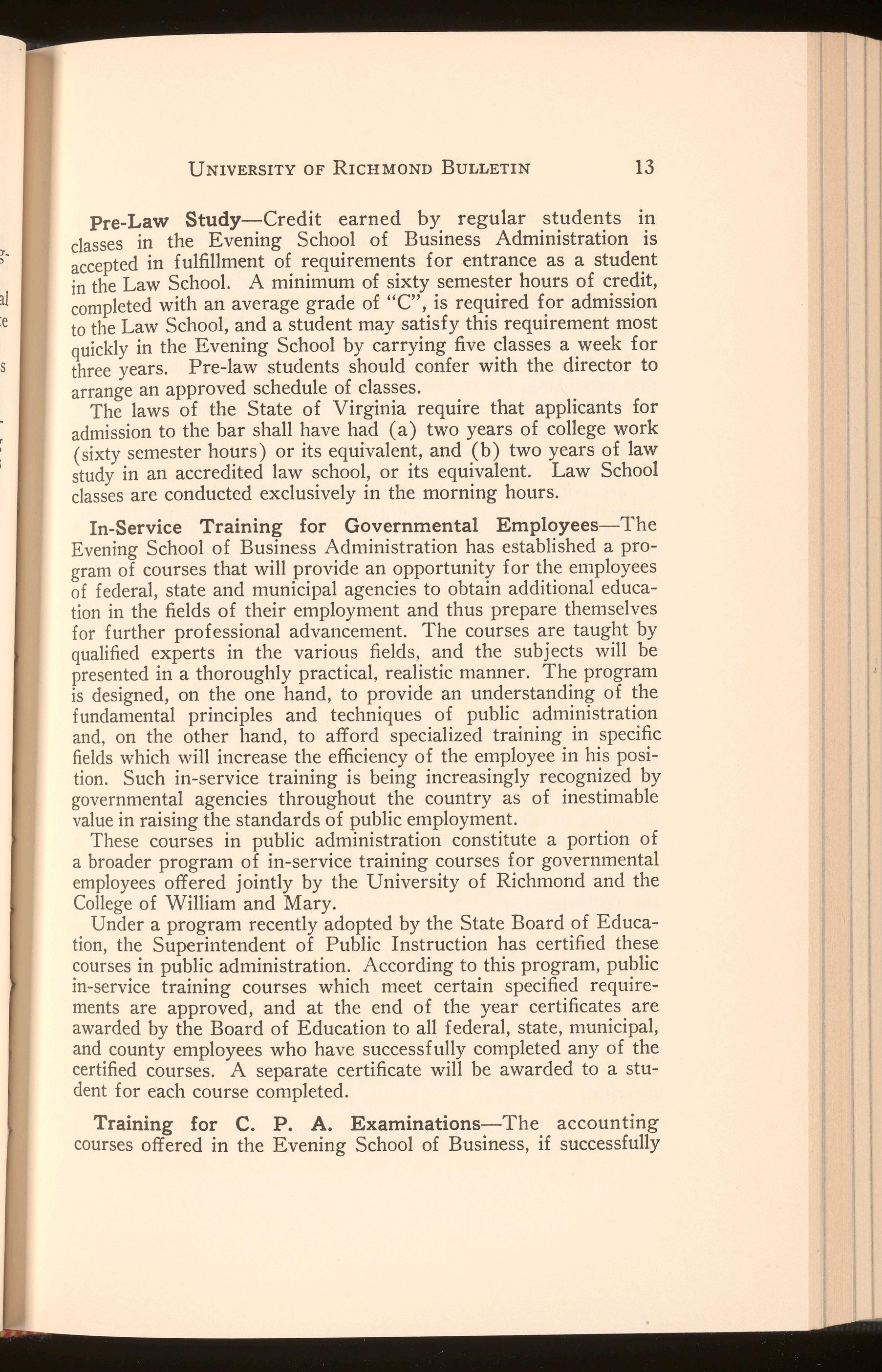
Pre-Law Study-Credit earned by regular students in classes in the Evening School of Business Administration is accepted in fulfillment of requirements for entrance as a student in the Law School. A minimum of sixty semester hours of credit, completed with an average grade of "C", is required for admission to the Law School, and a student may satisfy this requirement most quickly in the Evening School by carrying five classes a week for three years. Pre-law students should confer with the director to arrange an approved schedule of classes.
The laws of the State of Virginia require that applicants for admission to the bar shall have had (a) two years of college work ( sixty semester hours) or its equivalent, and (b) two years of law study in an accredited law school, or its equivalent. Law School classes are conducted exclusively in the morning hours.
In-Service Training for Governmental Employees-The Evening School of Business Administration has established a program of courses that will provide an opportunity for the employees of federal, state and municipal agencies to obtain additional education in the fields of their employment and thus prepare themselves for further professional advancement. The courses are taught by qualified experts in the various fields, and the subjects will be presented in a thoroughly practical, realistic manner. The program is designed, on the one hand, to provide an understanding of the fundamental principles and techniques of public administration and, on the other hand, to afford specialized training in specific fields which will increase the efficiency of the employee in his position. Such in-service training is being increasingly recognized by governmental agencies throughout the country as of inestimable value in raising the standards of public employment.
These courses in public administration constitute a portion of a broader program of in-service training courses for governmental employees offered jointly by the University of Richmond and the College of William and Mary.
Under a program recently adopted by the State Board of Education, the Superintendent of Public Instruction has certified these courses in public administration. According to this program, public in-service training courses which meet certain specified requirements are approved, and at the end of the year certificates are awarded by the Board of Education to all federal, state, municipal, and county employees who have successfully completed any of the certified courses. A separate certificate will be awarded to a student for each course completed.
accounting courses offered in the Evening School of Business, if successfully
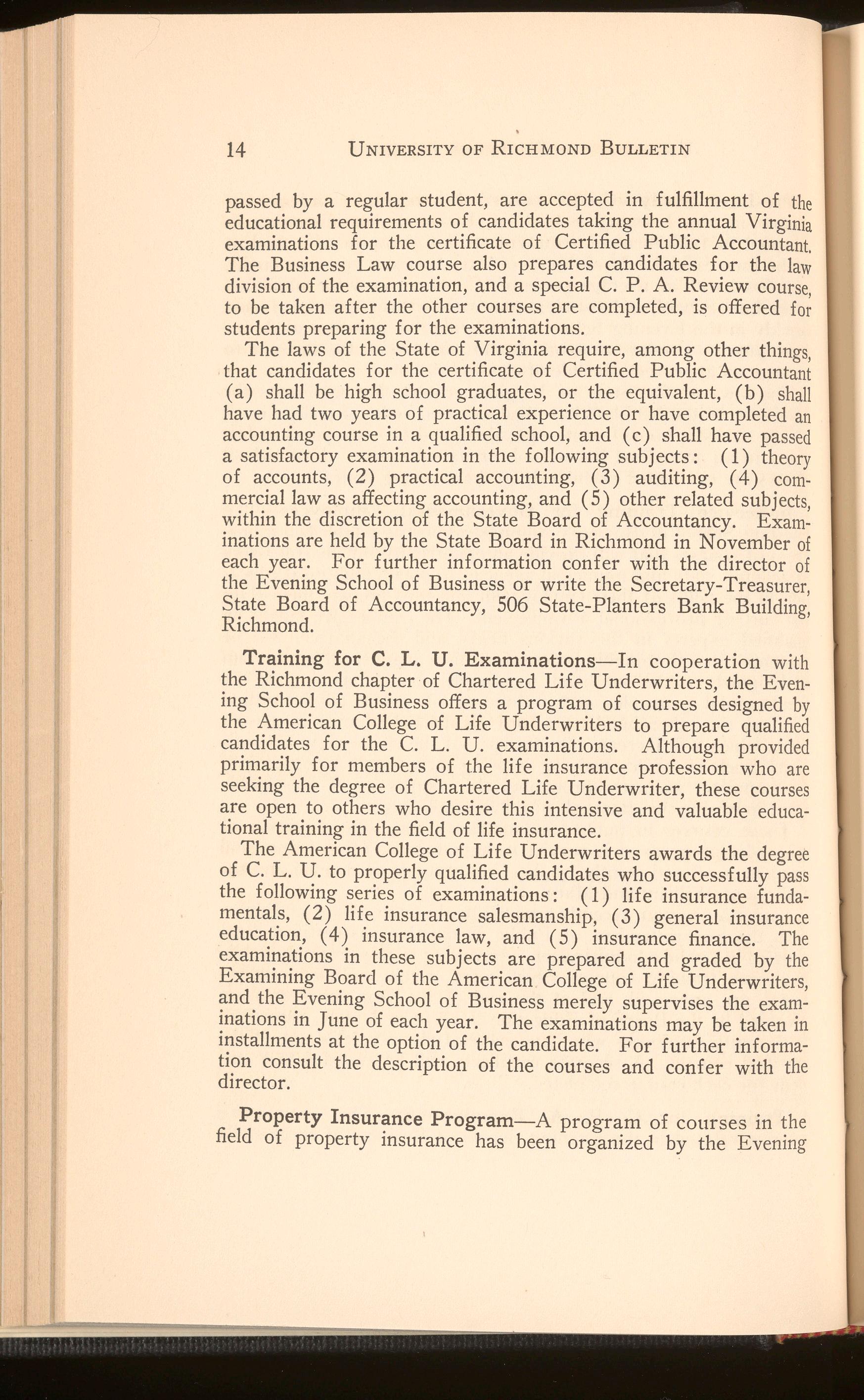
passed by a regylar student, ar~ accepte1 in fulfillment <;>f.t~e educational requtrements of candidates takmg the annual V1rgin1a examinations for the certificate of Certified Public Accountant. The Business Law course also prepares candidates for the law division of the examination, and a special C. P. A. Review course, to be taken after the other courses are completed, is offered for students preparing for the examinations.
The laws of the State of Virginia require, among other things, that candidates for the certificate of Certified Public Accountant (a) shall be high school graduates, or the equivalent, (b) shall have had two years of practical experience or have completed an accounting course in a qualified school, and ( c) shall have passed a satisfactory examination in the following subjects: ( 1) theory of accounts, (2) practical accounting, ( 3) auditing, ( 4) commercial law as affecting accounting, and ( 5) other related subjects, within the discretion of the State Board of Accountancy. Examinations are held by the State Board in Richmond in November of each year. For further information confer with the director of the Evening School of Business or write the Secretary-Treasurer, State Board of Accountancy, 506 State-Planters Bank Building, Richmond.
for C. L.
cooperation with the Richmond chapter of Chartered Life Underwriters, the Evening School of Business offers a program of courses designed by the American College of Life Underwriters to prepare qualified candidates for the C. L. U. examinations. Although provided primarily for members of the life insurance profession who are seeking the degree of Chartered Life Underwriter, these courses are open to others who desire this intensive and valuable educational training in the field of life insurance.
The American College of Life Underwriters awards the degree of C. L. U. to properly qualified candidates who successfully pass the following series of examinations: ( 1) life insurance fundamentals, (2) life insurance salesmanship, (3) general insurance education, ( 4) insurance law, and ( 5) insurance finance. The examinations in these subjects are prepared and graded by the Examining Board of the American College of Life Underwriters, and the Evening School of Business merely supervises the examinations in June of each year. The examinations may be taken in installments at the option of the candidate. For further information consult the description of the courses and confer with the director.
program of courses in the field of property insurance has been organized by the Evening
the inia 1nt. law rse, for gs, mt all an ed ry nB, 1· lf ,£ r, r ,,
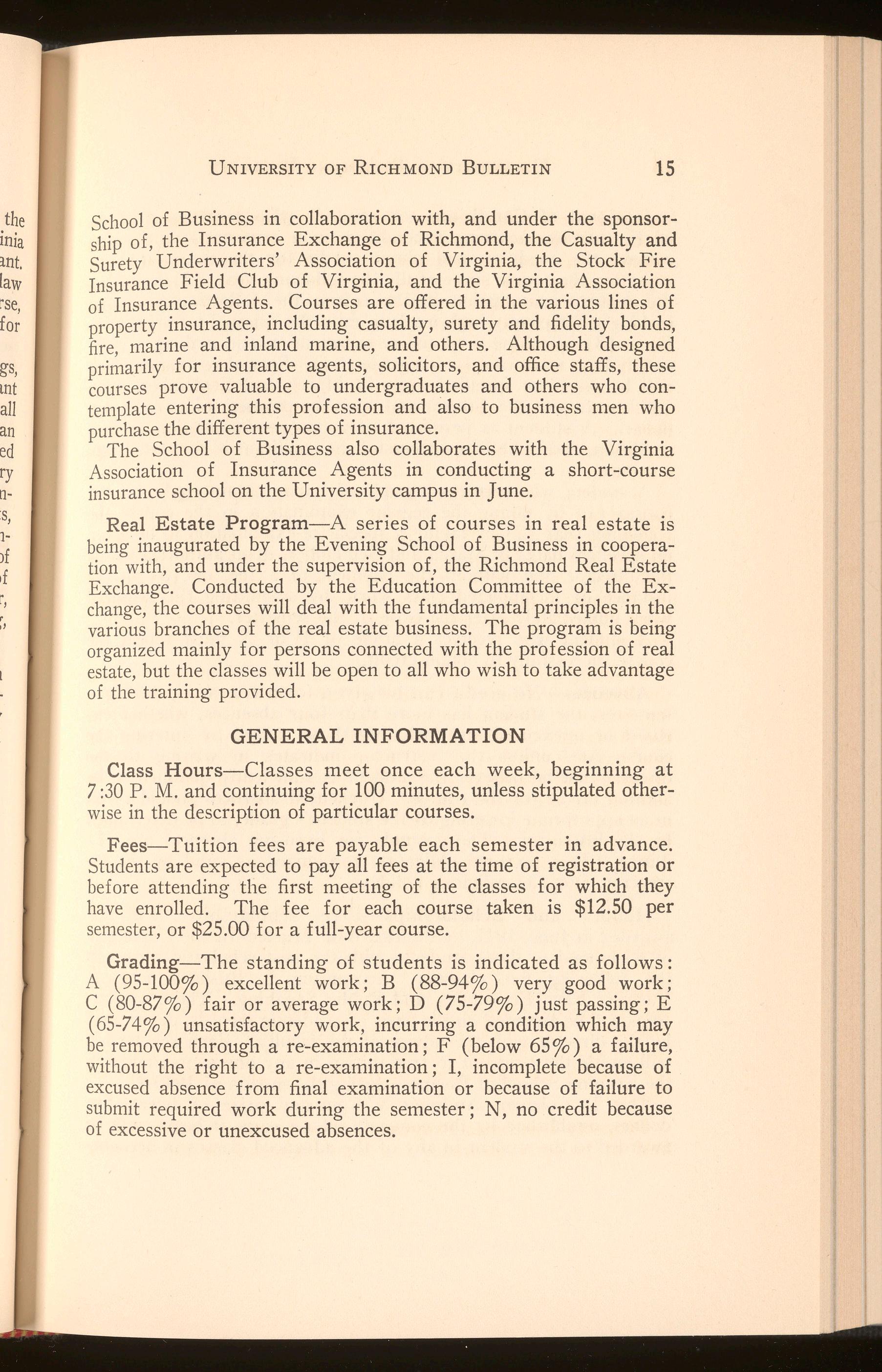
School of Business in collaboration with, and under the sponsorship of, the Insurance Exchange of Richmond, the Casualty and Surety Underwriters' Association of Virginia, the Stock Fire Insurance Field Club of Virginia, and the Virginia Association of Insurance Agents. Courses are offered in the various lines of property insurance, including casualty, surety and fidelity bonds, fire, marine and inland marine, and others. Although designed primarily for insurance agents, solicitors, and office staffs, these courses prove valuable to undergraduates and others who contemplate entering this profession and also to business men who purchase the different types of insurance.
The School of Business also collaborates with the Virginia Association of Insurance Agents in conducting a short-course insurance school on the University campus in June.
Real Estate Program-A series of courses in real estate is being inaugurated by the Evening School of Business in cooperation with, and under the supervision of, the Richmond Real Estate Exchange. Conducted by the Education Committee of the Exchange, the courses will deal with the fundamental principles in the various branches of the real estate business. The program is being organized mainly for persons connected with the profession of real estate, but the classes will be open to all who wish to take advantage of the training provided.
Class Hours-Classes meet once each week, beginning at 7 :30 P. M. and continuing for 100 minutes, unless stipulated otherwise in the description of particular courses.
Fees-Tuition fees are payable each semester in advance. Students are expected to pay all fees at the time of registration or before attending the first meeting of the classes for which they have enrolled. The fee for each course taken is $12.50 per semester, or $25.00 for a full-year course.
Grading-The standing of students is indicated as follows: A (95-100%) excellent work; B (88-94%) very good work; C (80-87%) fair or average work; D (75-79%) just passing; E (65-74%) unsatisfactory work, incurring a condition which may be removed through a re-examination; F (below 65%) a failure, without the right to a re-examination ; I, incomplete because of excused absence from final examination or because of failure to submit required work during the semester; N, no credit because of excessive or unexcused absences.
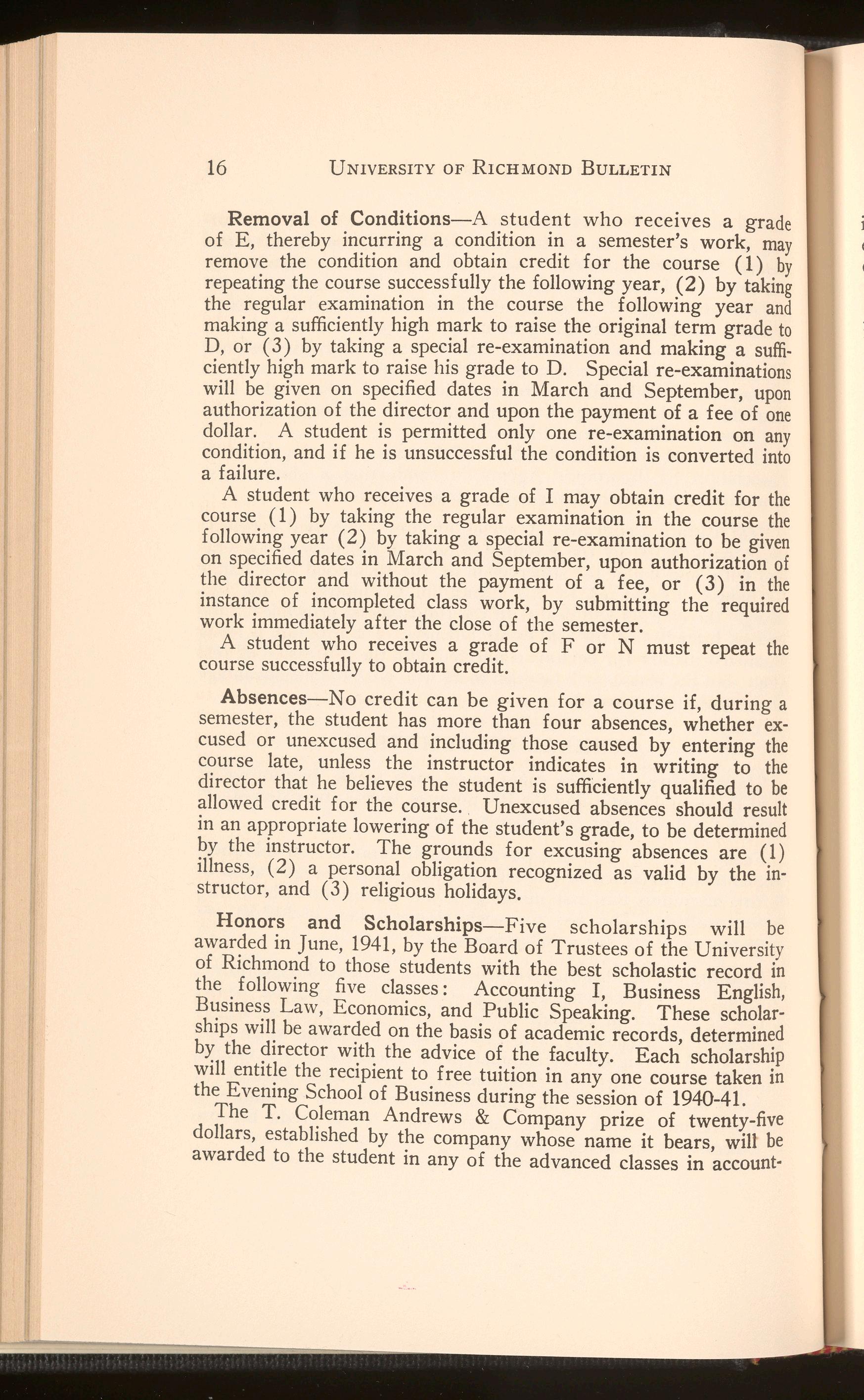
Removal of Conditions-A student who receives a grade of E, thereby incurring a condition in a semester's work, may remove the condition and obtain credit for the course ( 1) by repeating the course successfully the following year, (2) by taking the regular examination in the course the following year and making a sufficiently high mark to raise the original term grade to D, or ( 3) by taking a special re-examination and making a suffi- ciently high mark to raise his grade to D. Special re-examinations will be given on specified dates in March and September, upon authorization of the director and upon the payment of a fee of one dollar. A student is permitted only one re-examination on any condition, and if he is unsuccessful the condition is converted into a failure.
A student who receives a grade of I may obtain credit for the course ( 1) by taking the regular examination in the course the following year (2) by taking a special re-examination to be given on specified dates in March and September, upon authorization of the director and without the payment of a fee, or ( 3) in the instance of incompleted class work, by submitting the required work immediately after the close of the semester.
A student who receives a grade of F or N must repeat the course successfully to obtain credit.
Absences-No credit can be given for a course if, during a semester, the student has more than four absences, whether ex- cused or unexcused and including those caused by entering the course late, unless the instructor indicates in writing to the director that he believes the student is sufficiently qualified to be allowed credit for the course . . Unexcused absences should result in an appropriate lowering of the student's grade, to be determined by the instructor. The grounds for excusing absences are ( 1) illness, (2) a personal obligation recognized as valid by the in- structor, and ( 3) religious holidays.
Honors and Scholarships-Five scholarships will be awarded in June, 1941, by the Board of Trustees of the University of Richmond to those students with the best scholastic record in the following five classes: Accounting I, Business English, Business Law, Economics, and Public Speaking. These scholar- ships will be awarded on the basis of academic records, determined by the director with the advice of the faculty. Each scholarship will entit)e the recipient to free tuition in any one course taken in the Evenmg School of Business during the session of 1940-41.
The T. C~leman Andrews & Company prize of twenty-five dollars, established by the company whose name it bears, will be awarded to the student in any of the advanced classes in account·
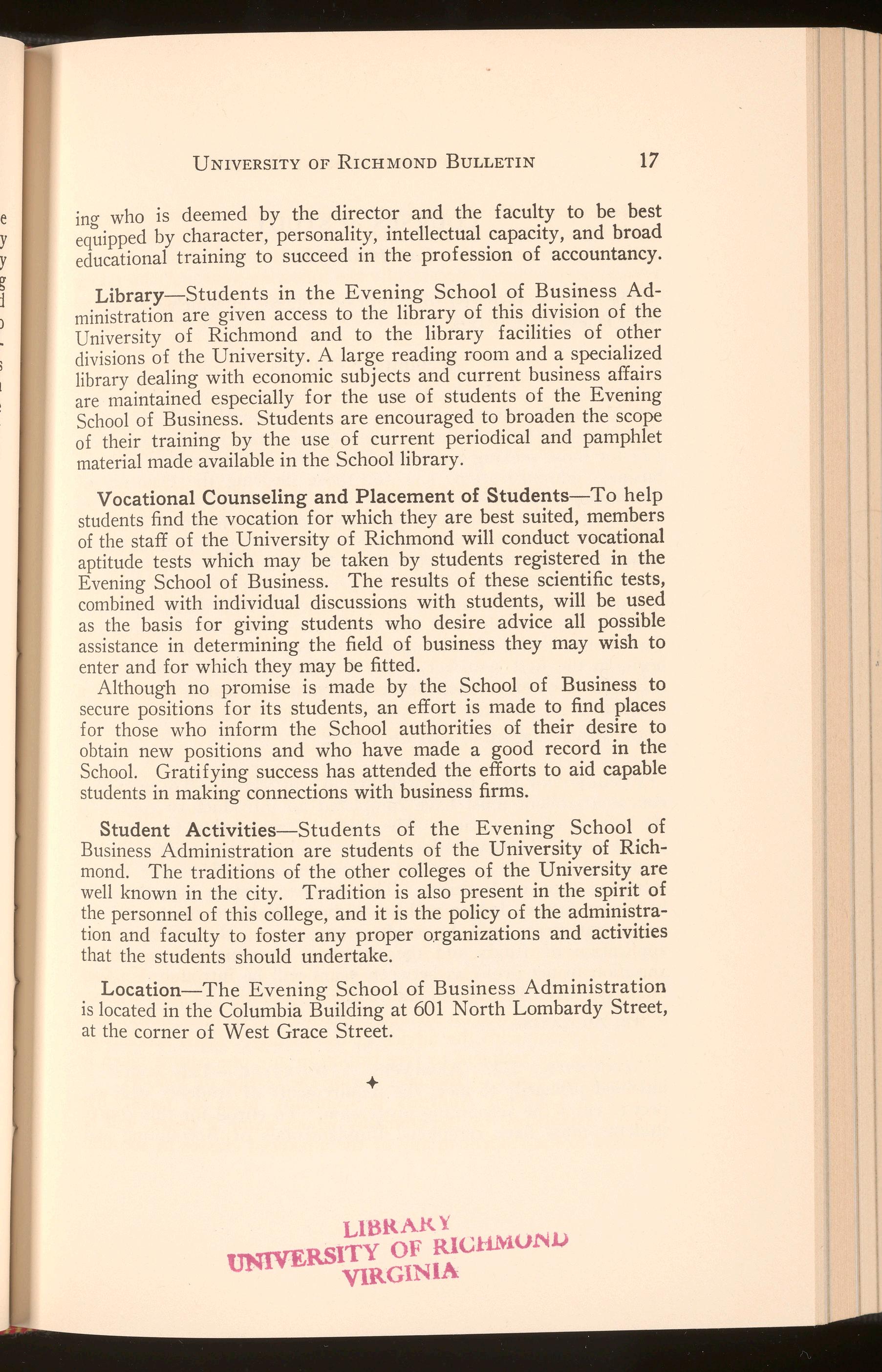
ino- who is deemed by the director and the faculty to be best eq~ipped by character, personality, intellectual capacity, and broad educational training to succeed in the profession of accountancy.
Library-Students in the Evening School of Business Administration are given access to the library of this division of the Univer sity of Richmond and to the library facilities of other divisions of the University. A large reading room and a specialized librar y dealing with economic subjects and current business affairs are maintained especially for the use of students of the Evening School of Business. Students are encouraged to broaden the scope of th eir training by the use of current periodical and pamphlet material made available in the School library.
Vocational Counseling and Placement of Students-To help student s find the vocation for which they are best suited, members of the staff of the University of Richmond will conduct vocational aptitude tests which may be taken by students registered in the Evening School of Business. The results of these scientific tests, combined with individual discussions with students, will be used as the basis for giving students who desire advice all possible assistance in determining the field of business they may wish to enter and for which they may be fitted.
Although no promise is made by the School of Business to secur e position s for its students, an effort is made to find places for tho se who inform the School authorities of their desire to obtain n ew positions and who have made a good record in the School. Gratifying success has attended the efforts to aid capable students in making connections with business firms.
Student Activities-Students of the Evening School of Business Admini stration are students of the University of Richmond The traditions of the other colleges of the University are well known in the city. Tradition is also present in the spirit of the per sonnel of this college, and it is the policy of the administration and faculty to foster any proper organizations and activities that th e students should undertake.
. Location-The Evening School of Business Administration 1s locat ed in the Columbia Building at 601 North Lombardy Street, at the corner of West Grace Street.
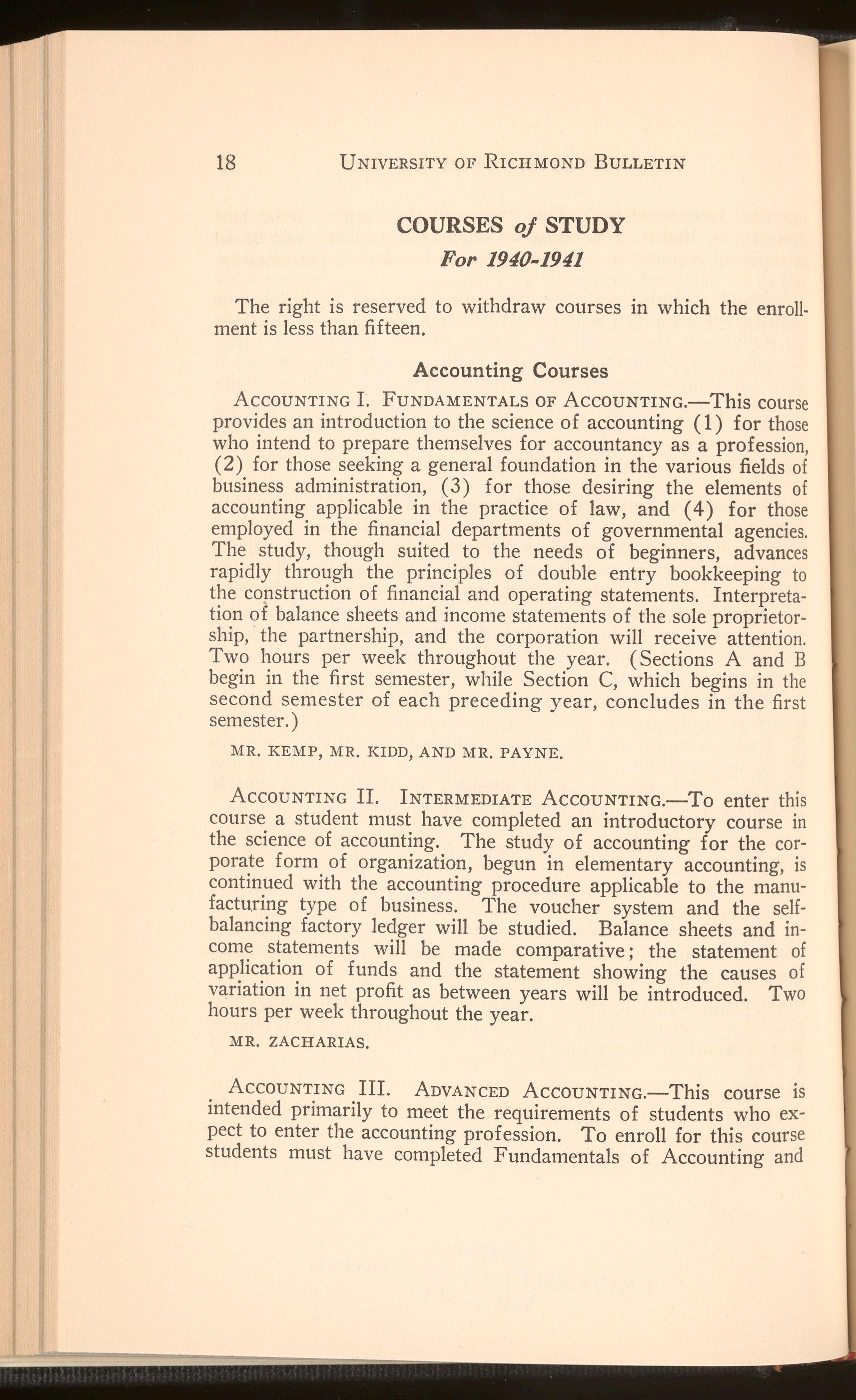
For 1940-1941
The right is reserved to withdraw courses in which the enrollment is less than fifteen.
AccouNTING I. FUNDAMENTALSOF AccouNTING.-This course provides an introduction to the science of accounting ( 1) for those who intend to prepare themselves for accountancy as a profession, (2) for those seeking a general foundation in the various fields of business administration, ( 3) for those desiring the elements of accounting applicable in the practice of law, and ( 4) for those employed in the financial departments of governmental agencies. The study, though suited to the needs of beginners, advances rapidly through the principles of double entry bookkeeping to the coµstruction of financial and operating statements. Interpretation of balance sheets and income statements of the sole proprietorship, the partnership, and the corporation will receive attention. Two hours per week throughout the year. ( Sections A and B begin in the first semester, while Section C, which begins in the second semester of each preceding year, concludes in the first semester.)
MR. KEMP,MR. KIDD,ANDMR. PAYNE.
AccouNTING II. INTERMEDIATEAccouNTING.-To enter this course a student must have completed an introductory course in the science of accounting. The study of accounting for the corporate form of organization, begun in elementary accounting, is continued with the accounting procedure applicable to the manufacturing type of business. The voucher system and the selfbalancing factory ledger will be studied. Balance sheets and income statements will be made comparative; the statement of application of funds and the statement showing the causes of variation in net profit as between years will be introduced. Two hours per week throughout the year.
MR. ZACHARIAS,
AccouNTING III. ADVANCEDAccouNTING.-This course is intended primarily to meet the requirements of students who expect to enter the accounting profession. To enroll for this course students must have completed Fundamentals of Accounting and
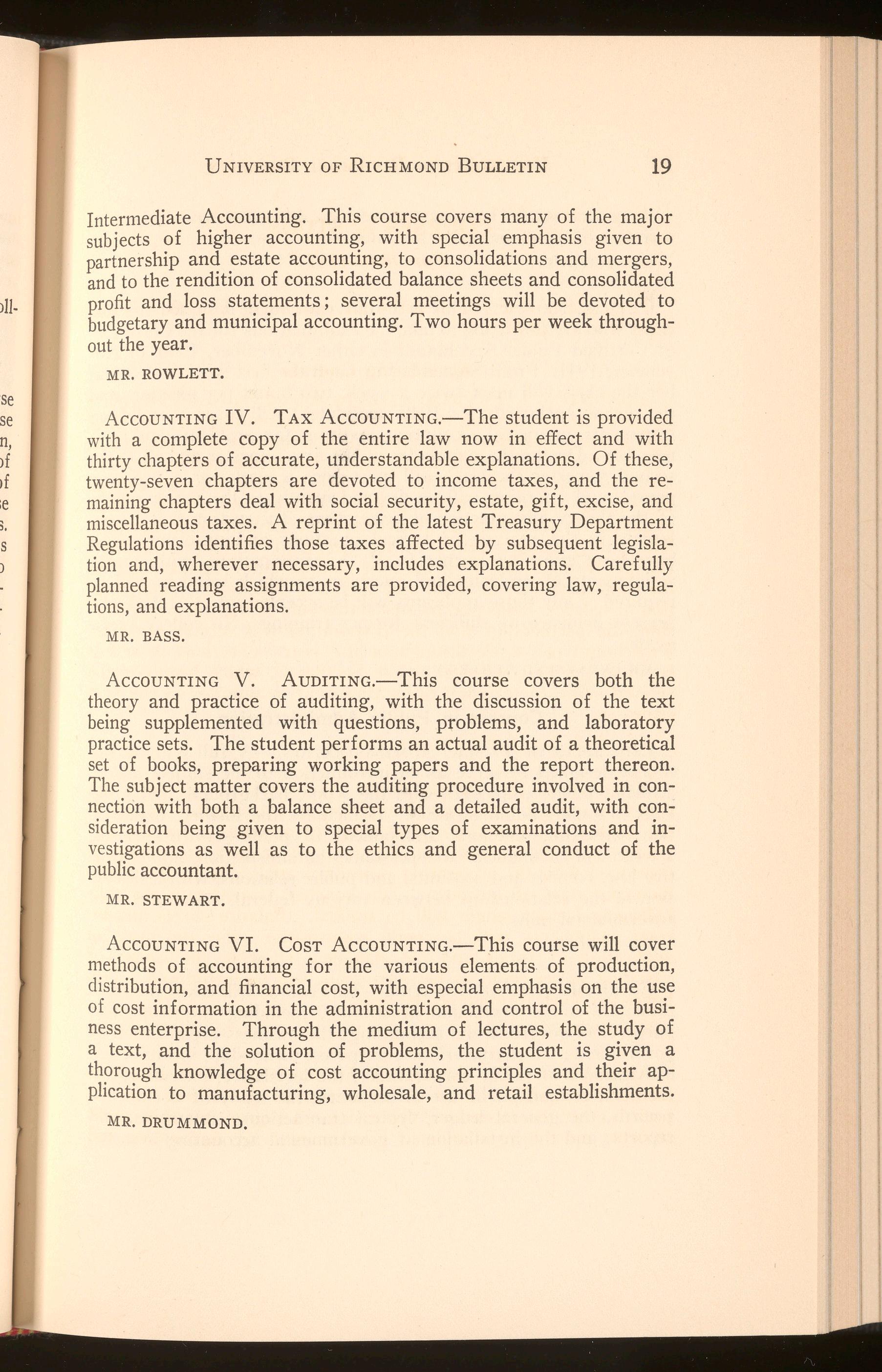
Intermediate Accounting. This course covers many of the major subjects of higher accounting, with special emphasis given to partnership and estate accounting, to consolidations and mergers, and to the rendition of consolidated balance sheets and consolidated profit and loss statements; several meetings will be devoted to budgetary and municipal accounting. Two hours per week throughout the year.
MR.ROWLETT.
AccouNTING IV. TAX AccouNTING.-The student is provided with a complete copy of the entire law now in effect and with thirty chapters of accurate, understandable explanations. Of these, twenty-seven chapters are devoted to income taxes, and the remaining chapters deal with social security, estate, gift, excise, and miscellaneous taxes. A reprint of the latest Treasury Department Regulations identifies those taxes affected by subsequent legislation and, wherever necessary, includes explanations. Carefully planned reading assignments are provided, covering law, regulations, and explanations.
MR.BASS.
AccouNTING V. AuDITING.-This course covers both the theory and practice of auditing, with the discussion of the text being supplemented with questions, problems, and laboratory practice sets. The student performs an actual audit of a theoretical set of books, preparing working papers and the report thereon. The subject matter covers the auditing procedure involved in connection with both a balance sheet and a detailed audit, with consideration being given to special types of examinations and investigations as well as to the ethics and general conduct of the public accountant.
MR.STEWART.
AccouNTING VI. CosT AccouNTING.-This course will cover methods of accounting for the various elements of production, distribution, and financial cost, with especial emphasis on the use of cost information in the administration and control of the business enterprise. Through the medium of lectures, the study of a text, and the solution of problems, the student is given a thorough knowledge of cost accounting principles and their application to manufacturing, wholesale, and retail establishments.
MR.DRUMMOND,
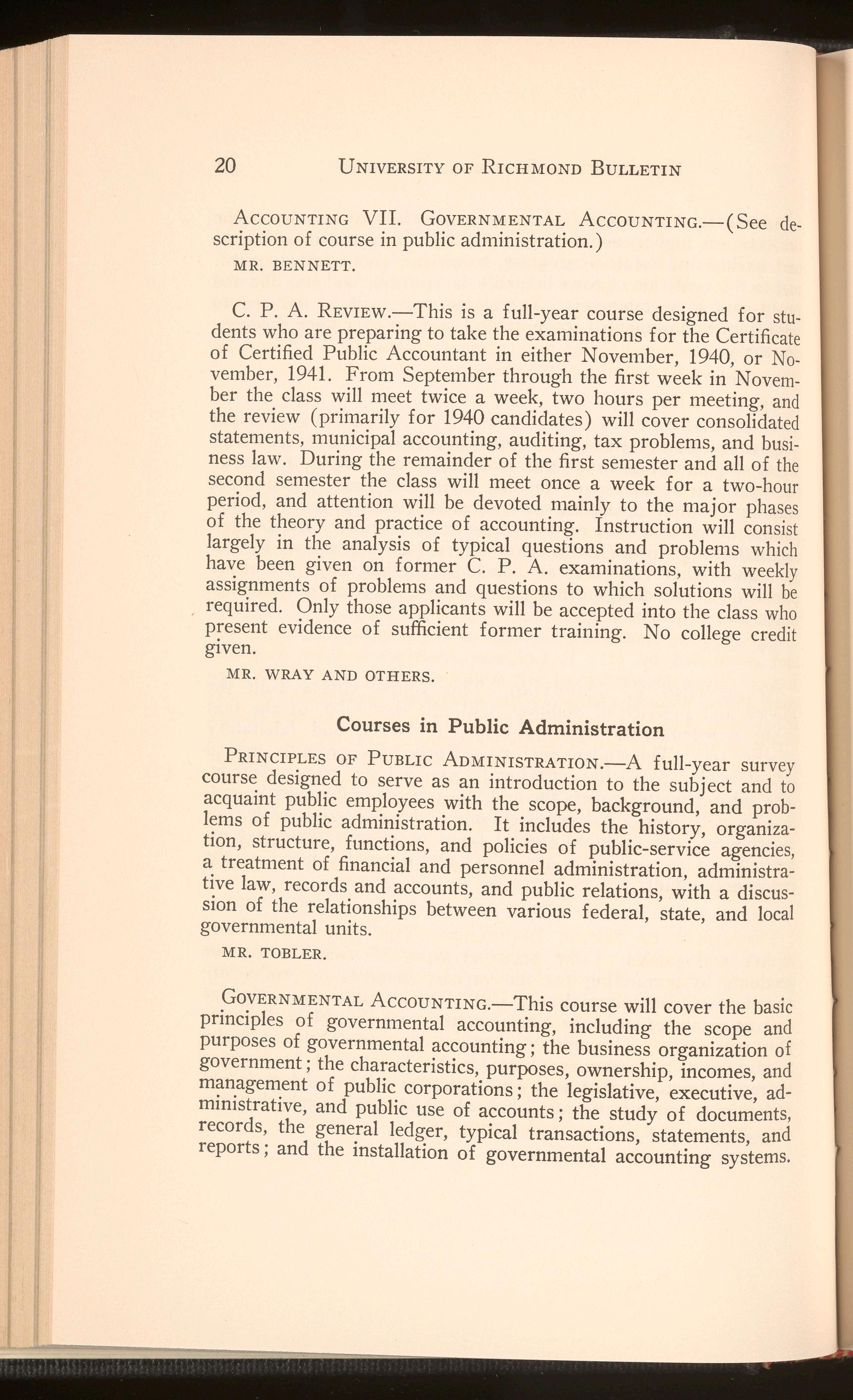
AccouNTING VII. GOVERNMENTALAccouNTING.-(See de- scription of course in public administration.)
MR. BENNETT.
C. P. A. REvrnw.-This is a full-year course designed for stu- dents who are preparing to take the examinations for the Certificate of Certified Public Accountant in either November, 1940, or No- vember, 1941. From September through the first week in Novem- ber the class will meet twice a week, two hours per meeting, and the review (primarily for 1940 candidates) will cover consolidated statements, municipal accounting, auditing, tax problems, and busi- ness law. During the remainder of the first semester and all of the second semester the class will meet once a week for a two-hour period, and attention will be devoted mainly to the major phases of the theory and practice of accounting. Instruction will consist largely in the analysis of typical questions and problems which have been given on former C. P. A. examinations, with weekly assignments of problems and questions to which solutions will be required. Only those applicants will be accepted into the class who present evidence of sufficient former training. No college credit given.
MR WRAYANDOTHERS.
PRINCIPLESOF PUBLIC ADMINISTRATION.-A full-year survey course designed to serve as an introduction to the subject and to acquaint public employees with the scope, background, and prob- lems of public administration. It includes the history, organiza- tion, structure, functions, and policies of public-service agencies, a treatment of financial and personnel administration, administra- tive law, records and accounts, and public relations, with a discus- sion of the relationships between various federal, state, and local governmental units.
MR. TOBLER.
GovERNMENTALAccouNTING.-This course will cover the basic principles of governmental accounting, including the scope and purposes of governmental accounting; the business organization of government; the characteristics, purposes, ownership, incomes, and management of public corporations; the legislative, executive, ad- ministrative, and public use of accounts; the study of documents, records, the general ledger, typical transactions, statements, and reports; and the installation of governmental accounting systems.
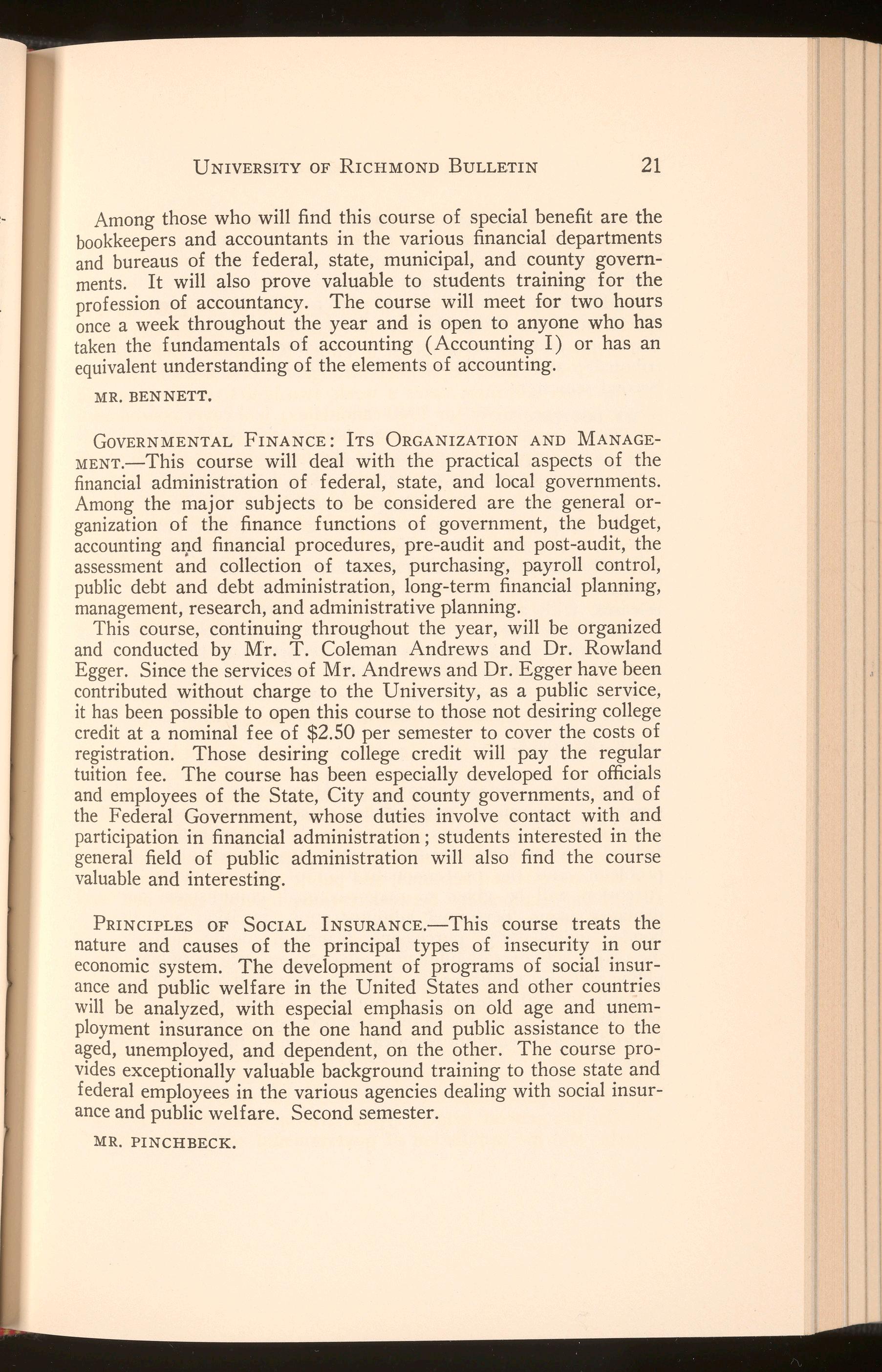
Among those who will find this course of special benefit are the bookkeepers and accountants in the various financial departments and bureaus of the federal, state, municipal, and county governments. It will also prove valuable to students training for the profession of accountancy. The course will meet for two hours once a week throughout the year and is open to anyone who has taken the fundamentals of accounting (Accounting I) or has an equivalent understanding of the elements of accounting.
MR.BENNETT.
GOVERNMENTALFINANCE: ITS
MANAGEMENT.-This course will deal with the practical aspects of the financial administration of federal, state, and local governments. Among the major subjects to be considered are the general organization of the finance functions of government, the budget, accounting al}d financial procedures, pre-audit and post-audit, the assessment and collection of taxes, purchasing, payroll control, public debt and debt administration, long-term financial planning, management, research, and administrative planning. This course, continuing throughout the year, will be organized and conducted by Mr. T. Coleman Andrews and Dr. Rowland Egger. Since the services of Mr. Andrews and Dr. Egger have been contributed without charge to the University, as a public service, it has been possible to open this course to those not desiring college credit at a nominal fee of $2.50 per semester to cover the costs of registration. Those desiring college credit will pay the regular tuition fee. The course has been especially developed for officials and employees of the State, City and county governments, and of the Federal Government, whose duties involve contact with and participation in financial administration; students interested in the general field of public administration will also find the course valuable and interesting.
course treats the nature and causes of the principal types of insecurity in our economic system. The development of programs of social insurance and public welfare in the United States and other countries will be analyzed, with especial emphasis on old age and unemployment insurance on the one hand and public assistance to the a~ed, unemployed, and dependent, on the other. The course provides exceptionally valuable background training to those state and federal employees in the various agencies dealing with social insurance and public welfare. Second semester.
MR. PINCHBECK.
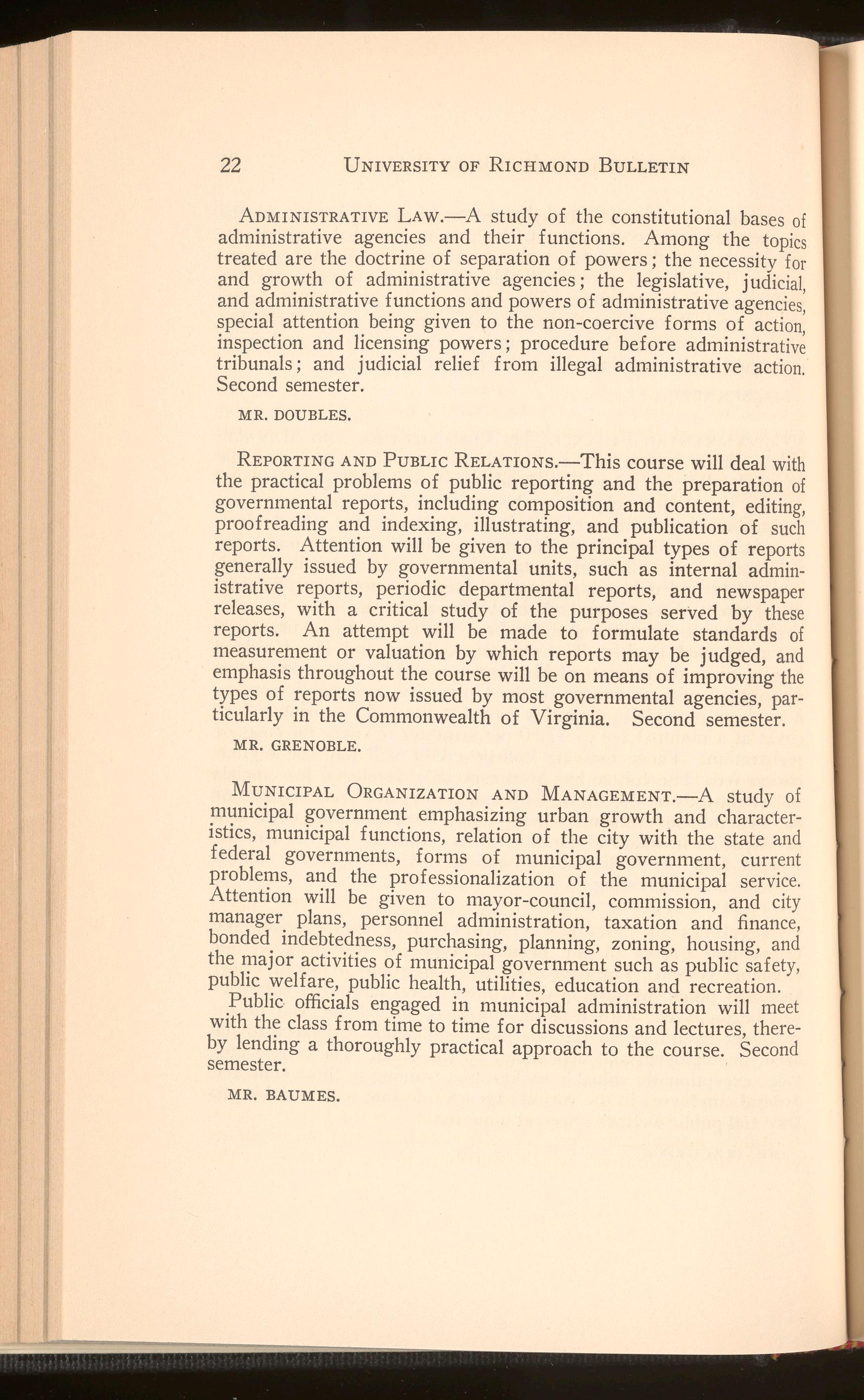
ADMINISTRATIVELAw.-A study of the constitutional bases of administrative agencies and their functions. Among the topics treated are the doctrine of separation of powers; the necessity for and growth of administrative agencies; the legislative, judicial, and administrative functions and powers of administrative agencies, special attention being given to the non-coercive forms of action, inspection and licensing powers; procedure before administrative tribunals; and judicial relief from illegal administrative action. Second semester.
MR.DOUBLES.
REPORTINGANDPUBLICRELATIONs.-This course will deal with the practical problems of public reporting and the preparation of governmental reports, including composition and content, editing, proofreading and indexing, illustrating, and publication of such reports. Attention will be given to the principal types of reports generally issued by governmental units, such as internal admin- istrative reports, periodic departmental reports, and newspaper releases, with a critical study of the purposes served by these reports. An attempt will be made to formulate standards of measurement or valuation by which reports may be judged, and emphasis throughout the course will be on means of improving the types of reports now issued by most governmental agencies, par- ticularly in the Commonwealth of Virginia. Second semester.
MR. GRENOBLE.
MUNICIPAL ORGANIZATIONAND MANAGEMENT.-A study of municipal government emphasizing urban growth and character- istics, municipal functions, relation of the city with the state and federal governments, forms of municipal government, current problems, and the professionalization of the municipal service. Attention will be given to mayor-council, commission, and city manager plans, personnel administration, taxation and finance, bonded indebtedness, purchasing, planning, zoning, housing, and the major activities of municipal government such as public safety, public welfare, public health, utilities, education and recreation. Public officials engaged in municipal administration will meet with the class from time to time for discussions and lectures, there- by lending a thoroughly practical approach to the course. Second semester.
MR. BAUMES.
C. L. U. CouRSE I. LIFE INSURANCE FuNDAMENTALs.-This course prepares the student for part I of the C. L. U. examinations. It deals primarily with (a) the economics of life insurance and ( b) the principles and practices of life insurance. Two hours per week. First semester.
MR.VADEN.
C. L. U. CouRsE II. LIFE INSURANCE SALESMANSHIP.-This course prepares the student for part II of the C. L. U. examinations. It is concerned with (a) the principles of salesmanship and ( b) the psychology of life insurance salesmanship. Two hours per week. Second semester.
MR. VADEN
C. L. U. CouRSE III. GENERALINSURANCEEDUCATION.-This cour se runs throughout the year and prepares the student for part III of the C. L. U. examinations. It includes the study of economics, government, and sociology, and provides the student of life insurance with that general education which is so essential to an intelligent analysis of life insurance problems. (Not offered in 1940-41) .
C. L. U. CouRsE IV. LIFE INSURANCE LAw -This course pr epares the student for part IV of the C. L. U. examinations. It contains (a) the fundamental concepts of commercial law applied t o life insurance, (b) a study of wills, trusts, and estates, and ( c) the problems of taxation relating to business insurance. (Not offered in 1940-41 ) .
MR.SCOTT.
C. L. U. CouRSE V. LIFE INSURANCEFINANCE.-This course pr epare s the student for part V of the C. L. U. examinations It t r eats the subjects of (a) corporation finance, (b) banking and cr edit , and ( c) investments, from the standpoint of life insurance analysis . (Not offered in 1940-41).
MR. RAWLES.
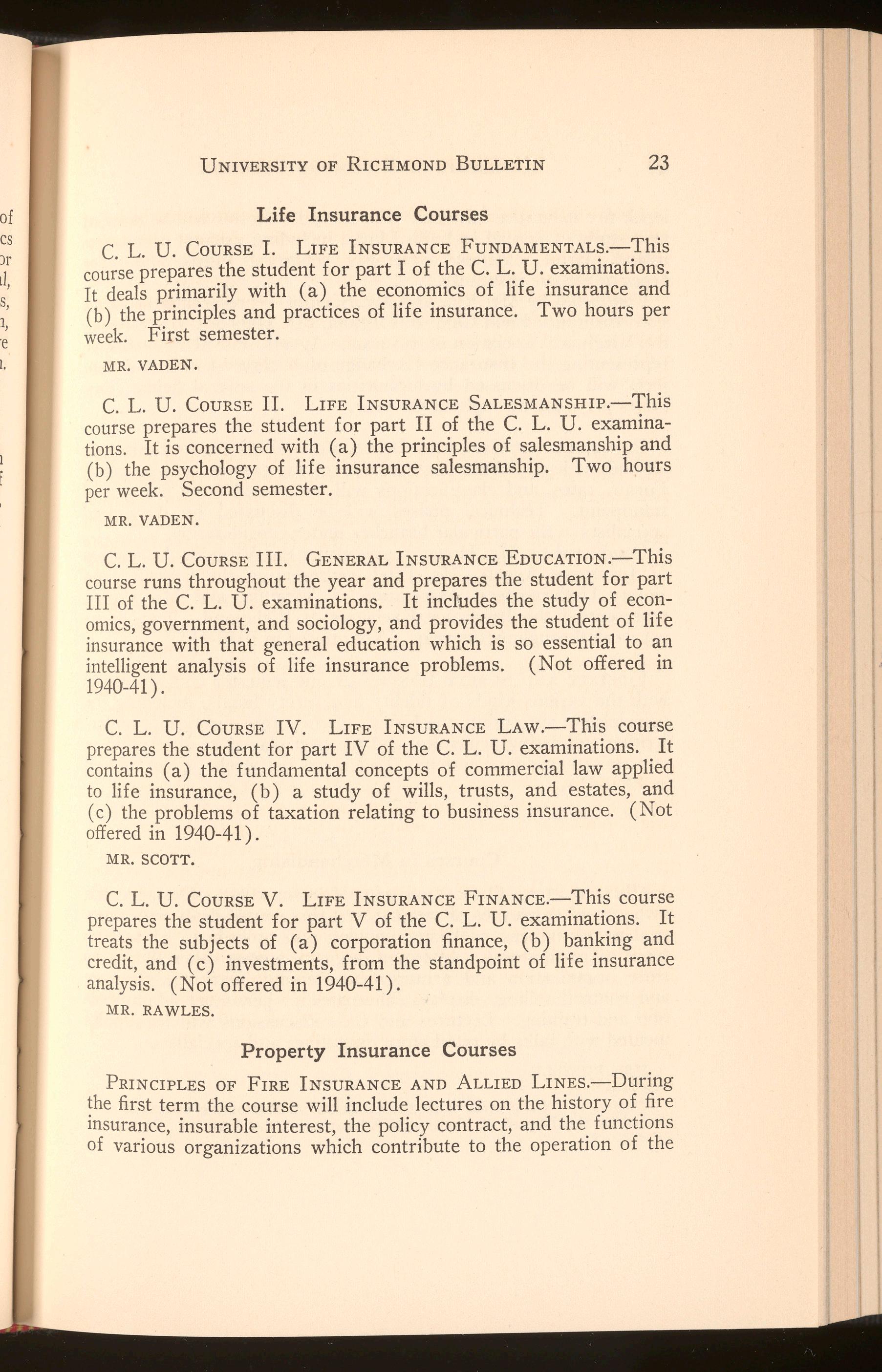
PRINCIPLES OF FIRE INSURANCEAND ALLIED LINEs.-During ~he first term the course will include lectures on the history of fire msurance, insurable interest, the policy contract, and the functions of various organizations which contribute to the operation of the
stock fire insurance business. The second semester will be devoted to a study of special and allied lines, including use and occupancy, inland marine, extended coverages, reporting forms, and other types of income insurance.
Conducted by Mr. Rice and Mr. Speight, representing the Stock Fire Insurance Field Club of Virginia, Mr. Hancock, representing the Virginia Association of Insurance Agents, and Mr. Goodridge, representing the Insurance Exchange of Richmond. Various sub- jects will be discussed by authorities in the several fields. Two hours per week throughout the year.
PRINCIPLESOF CASUALTYlNSURANCE.-This course deals with all lines of legal liability insurance involving persons and property. Forms, rates, and classifications will be treated from a practical standpoint. Technical phases will be discussed by recognized specialists in the particular branches under consideration.
Conducted by Mr. Howe, representing the Virginia Association of Insurance Agents, Mr. Eitel, representing the Casualty and Surety Underwriters' Association of Virginia, and Mr. Curtis, representing the Insurance Exchange of Richmond. Two hours per week throughout the year. (Not offered in 1940-41).
FIDELITYAND SURETYBoNDs.-A one-semester course dealing with the various kinds of fidelity and surety bonds, including the principles of suretyship, the history of corporate suretyship, under- writing and rating principles, and the part played by suretyship in our present economic system. Two hours per week. (Not offered in 1940-41).
MR.CURTIS.
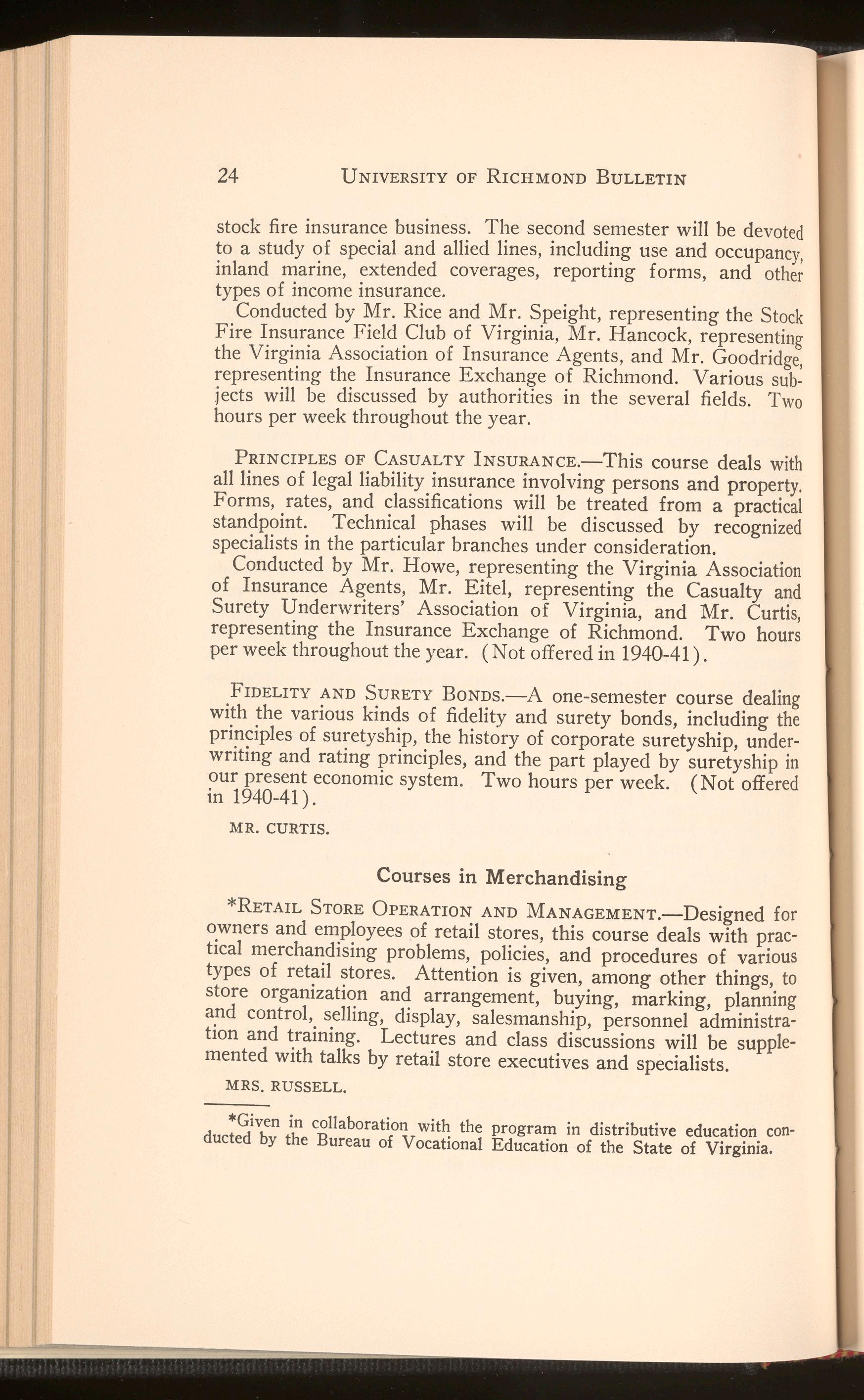
*RETAIL STOREOPERATIONAND MANAGEMENT.-Designed for owners and employees of retail stores, this course deals with prac- tical merchandising problems, policies, and procedures of various types of retail stores. Attention is given, among other things, to store organization and arrangement, buying, marking, planning and control, selling, display, salesmanship, personnel administra- tion and training. Lectures and class discussions will be supple- mented with talks by retail store executives and specialists.
MRS.RUSSELL.
*Given in collaboration with the program in distributive education con- ducted by the Bureau of Vocational Education of the State of Virginia.
ited 1cy, her JCk tng ge, lbWO th :y. :al ~d
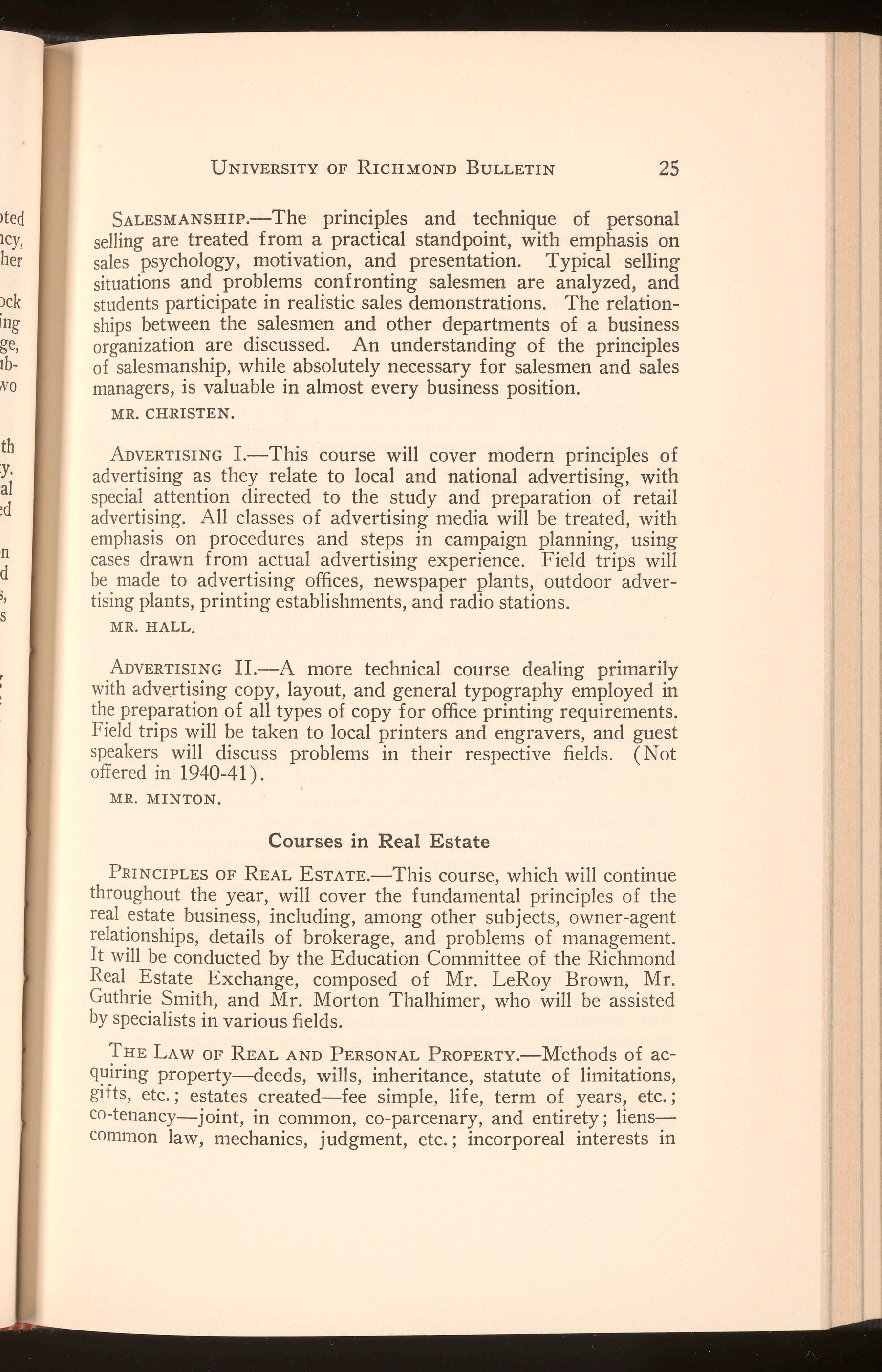
SALESMANSHIP.-The principles and technique of personal selling are treated from a practical standpoint, with emphasis on sales psychology, motivation, and presentation. Typical selling situations and problems confronting salesmen are analyzed, and students participate in realistic sales demonstrations. The relationships between the salesmen and other departments of a business organization are discussed. An understanding of the principles of salesmanship, while absolutely necessary for salesmen and sales managers, is valuable in almost every business position.
MR.CHRISTEN.
ADVERTISINGI.-This course will cover modern principles of advertising as they relate to local and national advertising, with special attention directed to the study and preparation of retail advertising. All classes of advertising media will be treated, with emphasis on procedures and steps in campaign planning, using cases drawn from actual advertising experience. Field trips will be made to advertising offices, newspaper plants, outdoor advertising plants, printing establishments, and radio stations.
MR.HALL,
ADVERTISINGIL-A more technical course dealing primarily with advertising copy, layout, and general typography employed in the preparation of all types of copy for office printing requirements. Field trips will be taken to local printers and engravers, and guest speakers will discuss problems in their respective fields. (Not offered in 1940-41 ) .
MR.MINTON.
PRINCIPLESOF REAL EsTATE.-This course, which will continue throughout the year, will cover the fundamental principles of the real estate business, including, among other subjects, owner-agent relationships, details of brokerage, and problems of management. It will be conducted by the Education Committee of the Richmond Real Estate Exchange, composed of Mr. LeRoy Brown, Mr. Guthrie Smith, and Mr. Morton Thalhimer, who will be assisted by specialists in various fields.
THE LAW OF REAL ANDPERSONALPROPERTY.-M'ethods of acq~iring property -deeds , wills, inheritance, statute of limitations, gifts, etc.; estates created-fee simple, life, term of years, etc.; co-tenancy-joint, in common, co-parcenary, and entirety; lienscommon law, mechanics, judgment, etc.; incorporeal interests in
land-profit and easements ; licenses ; landlord and tenant ; build- ing restrictions ; examination of title.
This course is of special importance to those whose work con- cerns real estate-the realtor, the broker, the insurance agent , the manager of an estate. Every business man, however, should have a knowledge of the law of property.
MR. HERRINK.
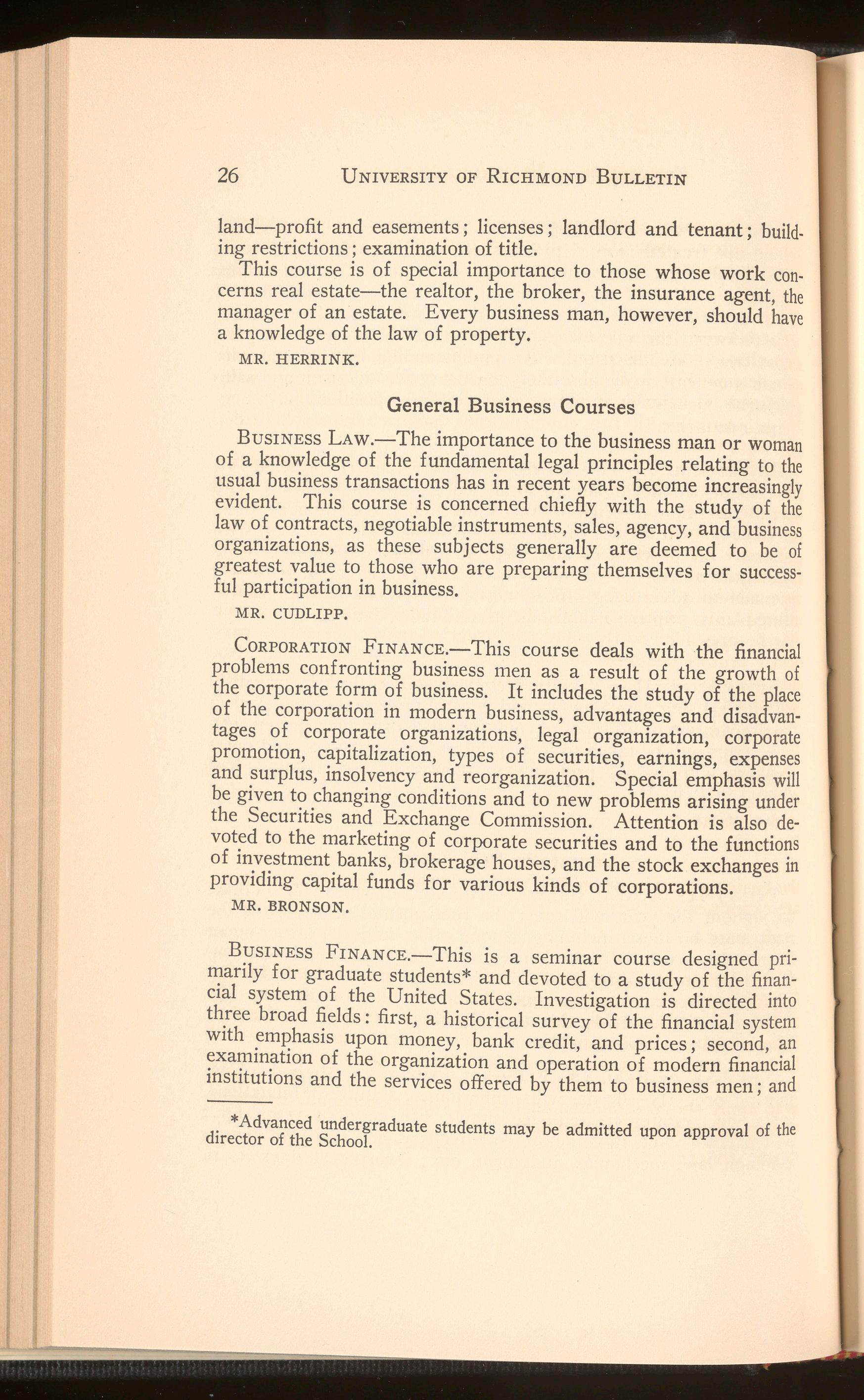
BusINESS LAw .-The importance to the business man or woman of a knowledge of the fundamental legal principles relating to the usual business transactions has in recent years become increasingly evident. This course is concerned chiefly with the study of the law of contracts, negotiable instruments, sales, agency, and business organizations, as these subjects generally are deemed to be of greatest value to those who are preparing themselves for success- ful participation in business.
MR. CUDLIPP.
CORPORATIONFINANCE.-This course deals with the financial problems confronting business men as a result of the growth of the corporate form of business. It includes the study of the place of the corporation in modern business, advantages and disadvan- tages of corporate organizations, legal organization, corporate promotion, capitalization, types of securities, earnings, expenses and surplus, insolvency and reorganization. Special emphasis will be given to changing conditions and to new problems arising under the Securities and Exchange Commission. Attention is also de- voted to the marketing of corporate securities and to the functions of investment banks, brokerage houses, and the stock exchanges in providing capital funds for various kinds of corporations.
MR.BRONSON.
BusINESs FINANCE.-This is a seminar course designed pri- lT,larilyfor graduate students* and devoted to a study of the finan- cial system of the United States. Investigation is directed into three broad fields: first, a historical survey of the financial system with emphasis upon money, bank credit, and prices; second, an examination of the organization and operation of modern financial institutions and the services offered by them to business men; and
*Advanced undergraduate students may be admitted upon approval of the director of the School.
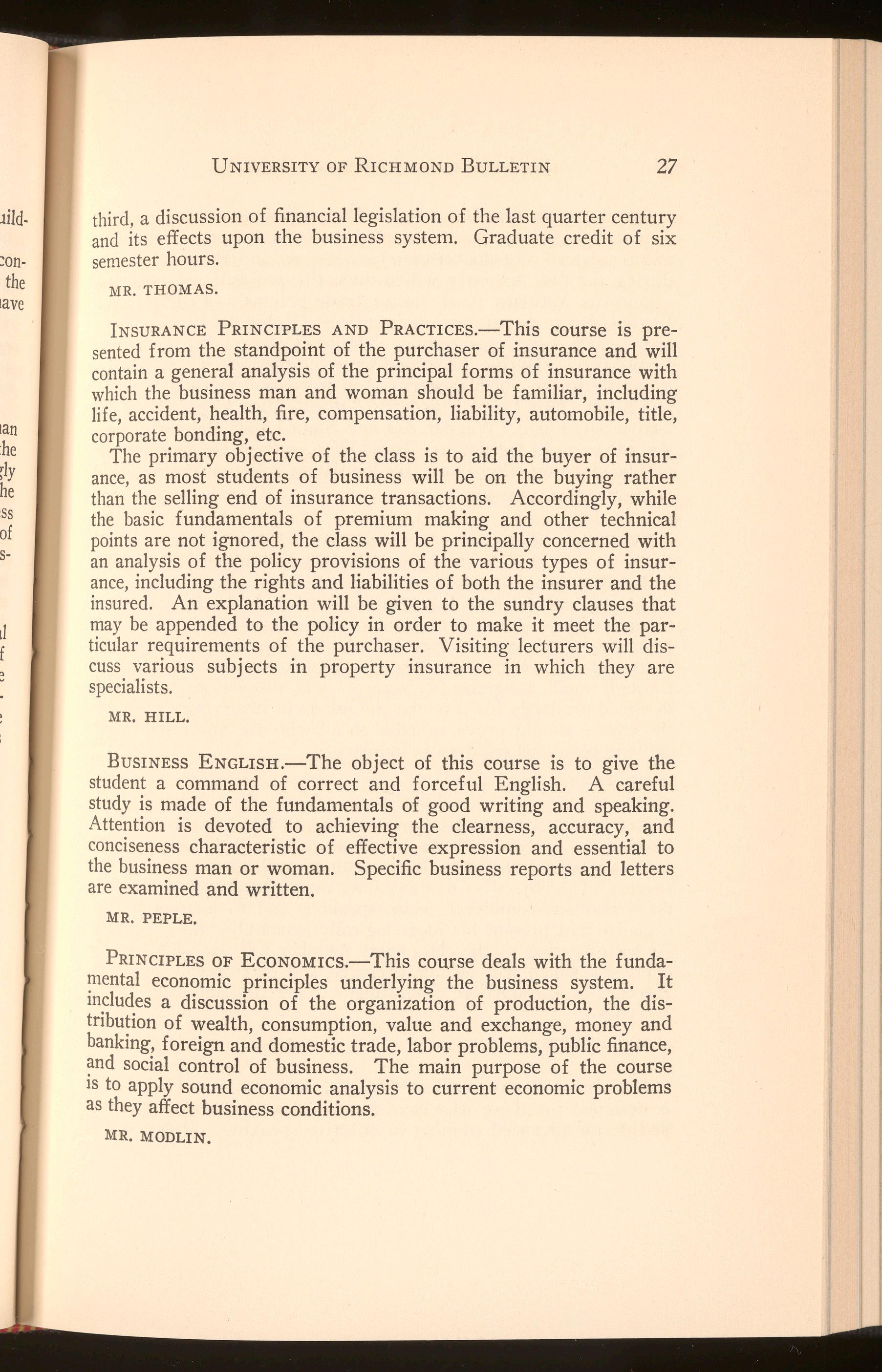
third, a discussion of financial legislation of the last quarter century and its effects upon the business system. Graduate credit of six semester hours.
MR.THOMAS.
INSURANCEPRINCIPLES AND PRACTICEs.-This course is presented from the standpoint of the purchaser of insurance and will contain a general analysis of the principal forms of insurance with which the business man and woman should be familiar, including life, accident, health, fire, compensation, liability, automobile, title, corporate bonding, etc.
The primary objective of the class is to aid the buyer of insurance, as most students of business will be on the buying rather than the selling end of insurance transactions. Accordingly, while the basic fundamentals of premium making and other technical points are not ignored, the class will be principally concerned with an analysis of the policy provisions of the various types of insurance, including the rights and liabilities of both the insurer and the insured. An explanation will be given to the sundry clauses that may be appended to the policy in order to make it meet the particular requirements of the purchaser. Visiting lecturers will discuss various subjects in property insurance in which they are specialists.
MR.HILL.
BUSINESSENGLISH.-The object of this course is to give the student a command of correct and forceful English. A careful study is made of the fundamentals of good writing and speaking. Attention is devoted to achieving the clearness, accuracy, and conciseness characteristic of effective expression and essential to the business man or woman. Specific business reports and letters are examined and written.
MR.PEPLE.
PRINCIPLESOF EcoNOMICs.-This course deals with the funda~1ental economic principles underlying the business system. It m~lud_esa discussion of the organization of production, the distribution of wealth, consumption, value and exchange, money and banking, foreign and domestic trade, labor problems, public finance, ~nd social control of business. The main purpose of the course 1s to apply sound economic analysis to current economic problems as they affect business conditions.
MR.MODLIN.
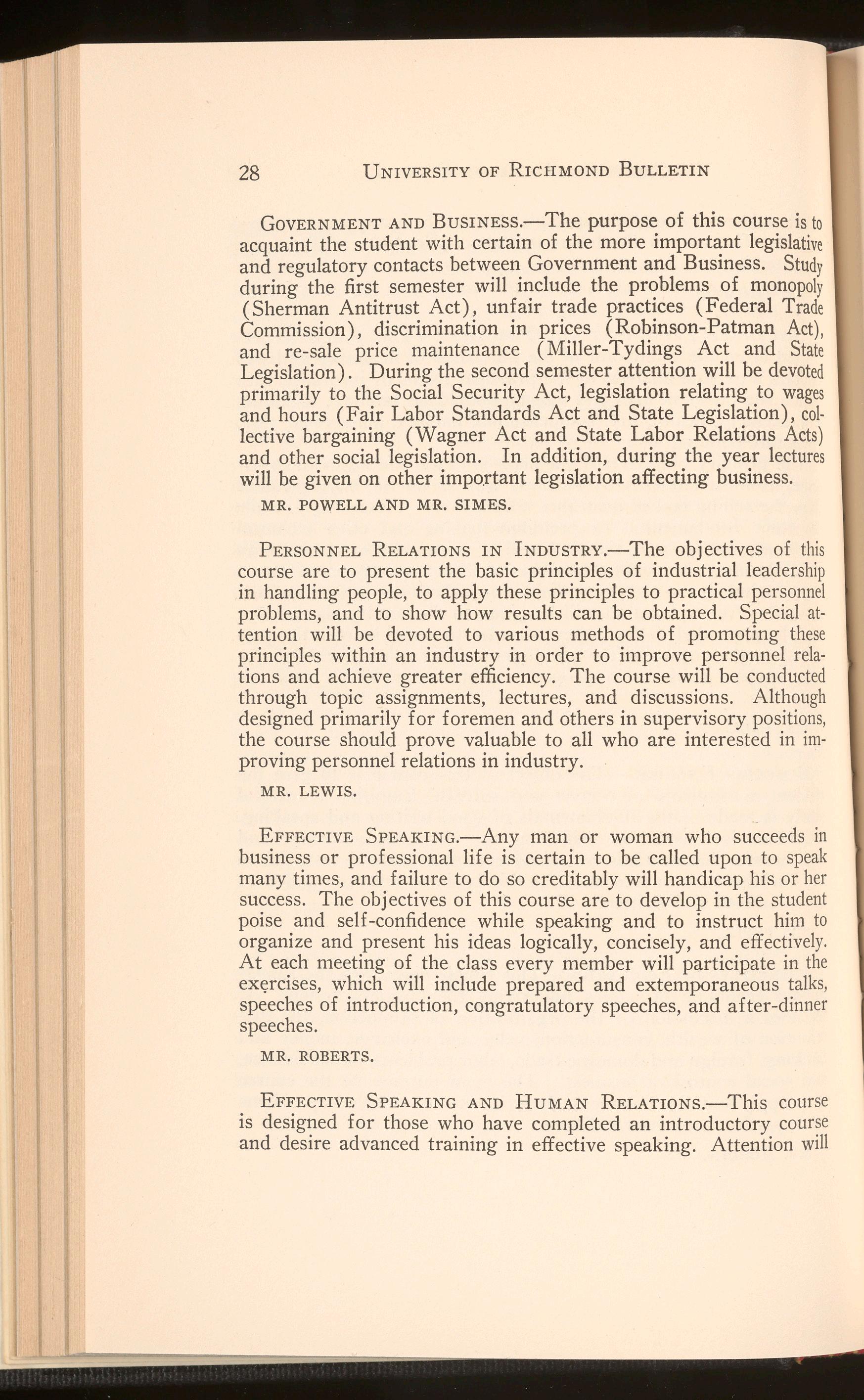
GOVERNMENTANDBusINEss.-The purpose of this course is to acquaint the student with certain of the more important legislative and regulatory contacts between Government and Business. Study during the first semester will include the problems of monopoly (Sherman Antitrust Act), unfair trade practices (Federal Trade Commission), discrimination in prices (Robinson-Patman Act), and re-sale price maintenance ( Miller-Tydings Act and State Legislation). During the second semester attention will be devoted primarily to the Social Security Act, legislation relating to wages and hours (Fair Labor Standards Act and State Legislation), collective bargaining (Wagner Act and State Labor Relations Acts) and other social legislation. In addition, during the year lectures will be given on other important legislation affecting business.
MR. POWELLANDMR. SIMES.
PERSONNELRELATIONSIN INDUSTRY.-The objectives of this course are to present the basic principles of industrial leadership in handling people, to apply these principles to practical personnel problems, and to show how results can be obtained. Special attention will be devoted to various methods of promoting these principles within an industry in order to improve personnel relations and achieve greater efficiency. The course will be conducted through topic assignments, lectures, and discussions. Although designed primarily for foremen and others in supervisory positions, the course should prove valuable to all who are interested in improving personnel relations in industry.
MR. LEWIS.
EFFECTIVESPEAKING.-Any man or woman who succeeds in business or professional life is certain to be called upon to speak many times, and failure to do so creditably will handicap his or her success. The objectives of this course are to develop in the student poise and self-confidence while speaking and to instruct him to organize and present his ideas logically, concisely, and effectively. At each meeting of the class every member will participate in the ex~rcises, which will include prepared and extemporaneous talks, speeches of introduction, congratulatory speeches, and after-dinner speeches.
MR. ROBERTS.
EFFECTIVESPEAKINGAND HUMAN
course is designed for those who have completed an introductory course and desire advanced training in effective speaking. Attention will
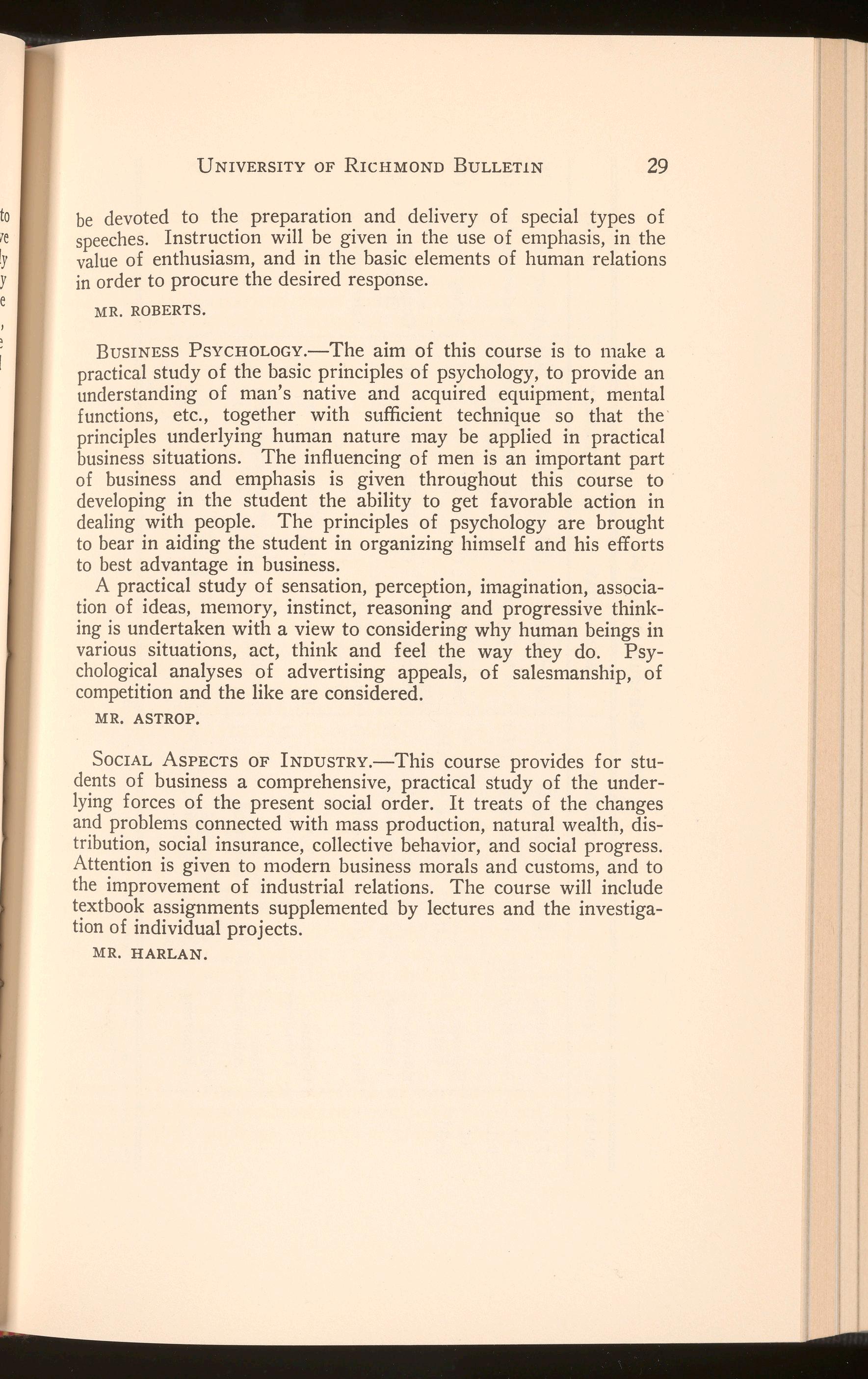
be devoted to the preparation and delivery of special types of speeches. Instruction will be given in the use of emphasis, in the value of enthusiasm, and in the basic elements of human relations in order to procure the desired response.
MR. ROBERTS.
BusINESS PsvcHOLOGY.-The aim of this course is to make a practical study of the basic principles of psychology, to provide an understanding of man's native and acquired equipment, mental functions, etc., together with sufficient technique so that the · principles underlying human nature may be applied in practical business situations. The influencing of men is an important part of business and emphasis is given throughout this course to developing in the student the ability to get favorable action in dealing with people. The principles of psychology are brought to bear in aiding the student in organizing himself and his efforts to best advantage in business.
A practical study of sensation, perception, imagination, association of ideas, memory, instinct, reasoning and progressive thinking is undertaken with a view to considering why human beings in various situations, act, think and feel the way they do. Psychological analyses of advertising appeals, of salesmanship, of competition and the like are considered.
MR. ASTROP.
SOCIALASPECTSOF lNDUSTRY.-This course provides for students of business a comprehensive, practical study of the underlying forces of the present social order. It treats of the changes and problems connected with mass production, natural wealth, distribution, social insurance, collective behavior, and social progress. Attention is given to modern business morals and customs, and to the improvement of industrial relations. The course will include textbook assignments supplemented by lectures and the investigation of individual projects.
MR. HARLAN.
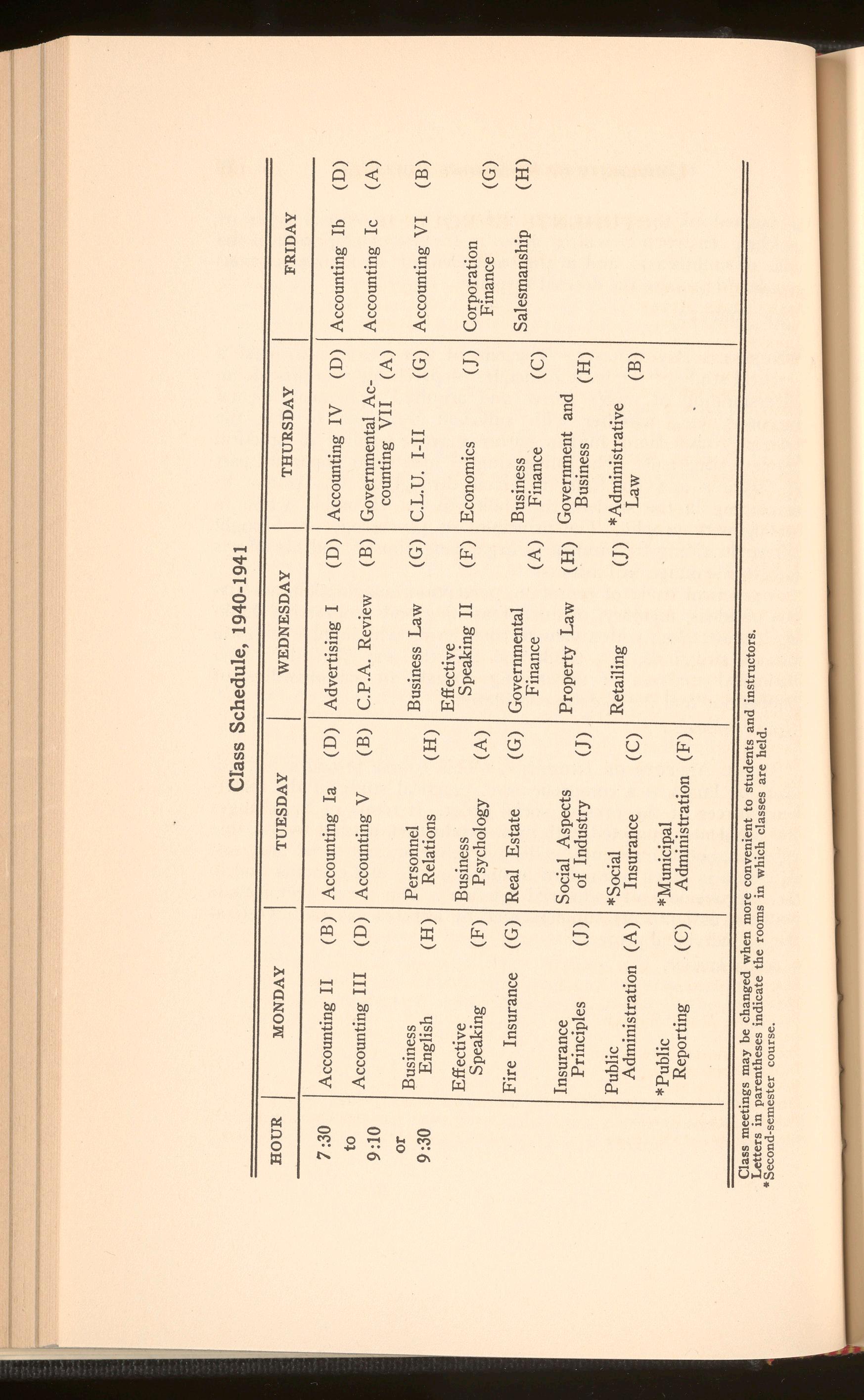
Class meetings may be changed when more convenient to students and instructors. Letters in parentheses indicate the rooms in which classes are held. *Second-semester course. (D) (B) (G) (F) (A) (H) (J) THURSDAY FRIDAY
7:30 Accounting II (B) Accounting Ia (D) Advertising I to Accounting III (D) Accounting V (B) C.P.A. Review 9:10 or Business Personnel Business Law 9:30 English (H) Relations (H) Effective
ABBOTT, WILLIAM GEORGE
ADAMS, JOHN HENRY
ADAMS, JOHN LLOYD
AILSWORTH, ALFRED DOUGLAS
ALLEY, CLAUDE RUSSELL
ALSOP, }AMES TINSLEY
AMENT, HOWARD LEWIS
ANDERSON, LELAND BoERHAAVE, JR.
ANDERSON, ROBERT HowARD
ANDREWS, ROBERT HUNTER
ARNALL, DOROTHY JEANNE
ASBURY, STEPHEN LA WREN CE
ASHWORTH, CARL VERNON
ATKINS, }OHN HERMAN
ATKINS, LIVINGSTON ELWOOD, JR.
ATKINSON, ALFRED VAUGHAN
ATKINSON, ATTICUS YANCEY
ATKINSON, HARRISON BROWN
AUSTIN, FRANK BROADUS, }R.
BABY AK, CYRIL MILLARD
BAcALis, Gus NICK
BAGLEY, }OHN WORTH
BAHEN, CHARLES FRANKLIN
BAILEY, RUFFIN R.
BAKER, SAMUEL HARVEY, }R.
BALDWIN, GEORGE WILLIAM
BALLOU, PATSY WHITE
BARNETT, SAM MARTIN, JR.
BATES, OLLIE BURTON, JR. BATKINS, CLAUDE L.
BAXTER, ETHEL A.
BEAL, FRANCIS STUART
BECK, HILAIRE EMIL, JR. BEASLEY, CLIFFORD MARCELLUS
BECHTEL, RICHARD CURRIE
BELL, LLOYD DOUGLAS
BELTON, THERESA MARY
BENEFIELD, JOSEPH TURBERVILLE
BEST, GEORGE LEWIS
BLANDFORD, ROLAND GILL
BLANDFORD, WILLIAM RANDOLPH
BLANTON, BENJAMIN w. L., III
BLANTON, }OHN BEVERLEY, ]R. BOEHLING, MARY ROSALIE
BOND, J. D.
BOOKER, HENRY LAWRENCE, JR.
BOOKER, OPHELIA l.
BOSWELL, SUE M.
BOTTIMORE, MRS. WILLIAM G. Bowis, GEORGE EDw ARD BOYD, HENRY ARMISTEAD
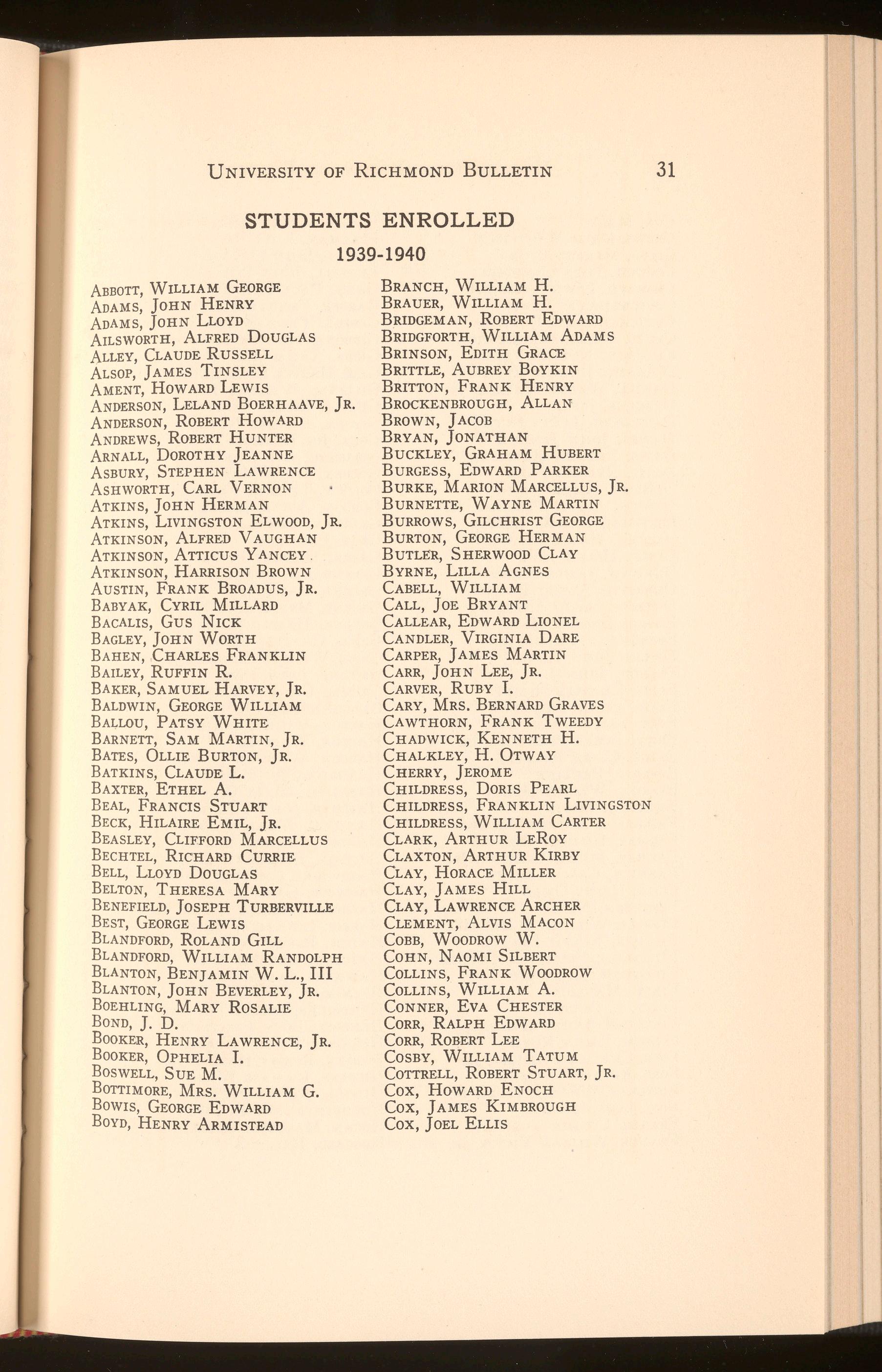
BRANCH, WILLIAM H.
BRAUER, WILLIAM H. BRIDGEMAN, ROBERT EDWARD BRIDGFORTH, WILLIAM ADAMS
BRINSON, EDITH GRACE
BRITTLE, AUBREY BOYKIN
BRITTON, FRANK HENRY
BROCKENBROUGH, ALLAN
BROWN, JACOB
BRYAN, JONATHAN
BUCKLEY, GRAHAM HUBERT
BURGESS, EDWARD PARKER
BURKE, MARION MARCELLUS, JR.
BURNETTE, WAYNE MARTIN
BURROWS, GILCHRIST GEORGE BURTON, GEORGE HERMAN
BUTLER, SHERWOOD CLAY BYRNE, LILLA AGNES
CABELL, WILLIAM
CALL, ]OE BRYANT
CALLEAR, EDw ARD LIONEL
CANDLER, VIRGINIA DARE
CARPER, JAMES MARTIN
CARR, ]OHN LEE, }R.
CARVER, RUBY I.
CARY, MRS. BERNARD GRAVES CAWTHORN, FRANK TWEEDY CHADWICK, KENNETH H.
CHALKLEY, H. OTWAY
CHERRY, JEROME
CHILDRESS, DORIS PEARL
CHILDRESS, FRANKLIN LlVINGSTON
CHILDRESS, WILLIAM CARTER
CLARK, ARTHUR LEROY
CLAXTON, ARTHUR KIRBY
CLAY, HORACE MILLER
CLAY, }AMES HILL
CLAY, LAWRENCE ARCHER
CLEMENT, ALVIS MACON COBB, WOODROW w. COHN, NAOMI SILBERT
COLLINS, FRANK WOODROW
COLLINS, WILLIAM A. CONNER, EVA CHESTER CORR, RALPH EDw ARD CORR, ROBERT LEE
COSBY, WILLIAM TATUM
COTTRELL, ROBERT STUART, JR. Cox, How ARD ENOCH Cox, }AMES KIMBROUGH Cox, JoEL ELLIS

Cox, MARY
CREWS, DAVID WHITFIELD
CROSS, MARION A., JR.
CROUCH, ]OHN CAMPBELL
CROWDER, LEWIS WILLIAM
CRUICKSHANK, LEWIS
CRUICKSHANKS, DOUGLAS
CRUTE, WILLIAM HAMILTON
CUTCHIN, NEUVAL VERSER
D'ADAMO, PHILLIP RAPHAEL
DANIEL, WALTER TAYLOR, ]R.
DASCHER, JERRY
DAVENPORT, ]AMES BUCK
DAVIES, JOHN ]ENKYN
DAVIS, THELMA HUFFMAN
DAVIS, RYLAND PAUL
DEBIASI, ALBERT JOHN
DENNIS, ALBERT PERCIVAL, JR.
DIETRICH, DALLAS ROBERT
DUDLEY, HARDY DREWREY
DUNN, HELEN JANE
DURHAM, ]AMES STUART
DURRETTE, ALBERT BEARD
DUTROW, DAVID ANDREW
EASON, DONALD HAINES
EBERSOLE, F. LESLIE, JR.
ECCLES, JOHN HENRY
ELLIOTT, JOHN J.
ELLIS, CHARLES ALBERT
ELLIS, FELIX TAYLOR
EPES, SAMUEL COFFMAN
ERNY, ]AMES PLEASANT, JR.
ESTES, CLARA FRANCES
EVERETT, PAULINE
EVERISS, WALTER HENRY
EWELL, J. DAVIS
FAIRBANK, ANDREW JACKSON
FARMER, EMMETT DONALD
FARMER, JOSEPH CLINTON, JR. FARNUM, GRACE CROOKS
FEILD, HARRY OWEN
FERGUSON, NELL
FERRELL, WILLIAM BARKSDALE
FISCHER, JOSEPH FRANCIS
FITZHUGH, FREDERICK TURNER
FITZHUGH, MARGARET
FIXEL, MAURICE
FLEET, S DOUGLAS
FLETCHER, ]AMES WILLIAM FOLSOM, EMILY RUTH
FORD, CHARLES PHILLIPS, JR
FORD, RYLAND HOLMAN
FOWLKES, WILLIAM HYDE, JR. Fox, JAMES JOSEPH
FRAKER, LUTHER TURNLEY
FRANCK, WILLIAM VICTOR, JR.
FREDERICKSEN, CRISPIN IRBY
FREEMAN, L. 0., JR.
FRIEND, JOHN EDWARD
FUSSELL, ]OHN WILLIAM
GANS, PAUL HAWKINS
GARBER, FREDERICK HENRY
GEORGE, THOMAS LEONARD
GrnBoNs, HUNTER McGUIRE
GIBBS, ANNA MERVAL
GILL, HARVEY STRACHAN, JR.
GILLETTE, WILLIAM HOLMES, JR.
GILSON, ROBERT SELLERS
GLASER, EDWARD GUNST
GODA, JOE HERBERT
GOLDBERG, ABE DANIEL
GOLDEN, !RENE MAE
GOLDEN, THOMAS FLEMING
GORDON, ALLEN MEYER
GRATTAN, GEORGE GILMER
GRAY, FRED LEE
GREEN, HERBERT F., JR.
GREENBAUM, FRANCES RosE
GREENE, CAROLYN
GREENE, MRS. EMILY T.
GREENE, HAROLD DAVID
GRIGG, CHARLES MEADE
GRIGG, WILLIAM EDWARD, JR.
GRIGSBY, ]OHN TAZE
GRIMM, CHARLES EDWIN
GUGGENHEIMER, KURT
HADDON, HUGH BLANTON
HADDON, WADE M.
HADDON, WOODROW ASHLEY
HAMILTON, ]OHN EDWARD
HAMILTON, MARY CHAPPELL
HAMMER, ]OHN HARVEY
HANCOCK, WILLIAM FRANK
HANSON, EDWARD WILCOX
HANSON, ELIZABETH HUGHES
HARDWICKE, CHARLES THOMAS, JR.
HARWOOD, GARLAND MELVIN, JR. HARRELL, CHARLES LYDON, JR. HARRIS, LINNAEUS WHITE
HATCH, ROBERT NORRIS
HATCHER, BEULAH MAY
HAWKINS, ]AMES DEWEY
HECKER, E. PAULINE
HENDRICKS, ROBERT THOMAS
HENDRIX, BOYD T ARLINGTON
HERNDON, BRODIE STRACHAN
HERVEY, ROBERT HARRIS, JR. HIGGINS, RICHARD WYNNE
HINTON, JOSEPH FLEMMON HOFHEIMER, NORMA ]ANET
HOGAN, MARGARET ROSALIND HOGGARD, HELEN S.
HOLLADAY, JOHN LITTLEPAGE HOLLAND, ELDRIDGE FORD HOLLAND, HENRY STRANGE, III
HoLSCLA W, ROBERT EUGENE
HoLT, SAMUEL EDWIN
HUB1lARD, EDGAR OVERTON
HUDGINS, CHRISTOPHER MANNING HUDSON, GEORGE WASHINGTON HOWEY, VIRGINIA SUSAN
HULCHER, BERNARD MATTHEW
HULCHER, JOHN R., JR.
HUTCHINSON, WARNER COURTNEY, JR. INGRAM, L. GEORGE
!RBY, WALTER SCOTT
JACOBSON, HERMAN ISRAEL
JAMES, RICHARD GREGORY
JOHNSON, HENRY SHEPHERD JOHNSTON, COLEMAN, JR.
JO NES, HELEN B. JONES, LEWIS KIRK
JONES, RUSSELL C.
JONES, WILLIAM HENRY
JONES, WILLIAM WALTON
KALMAN, REEVEN DAVID
KAPLAN, SIDNEY LEON KAY, JULIAN OXFORD
KELLEHER, JOSEPH MICHAEL
KENNEDY, DAVID CURRIE, JR.
KENNEDY, DAVID TINSLEY
KENT, CHARLES WILLIAMSON
KERHULAS, GEORGE THEROS KESSLER, JOHN WESLEY
KIRTLEY, EDWARD BUFORD
KOVACS, ALEXANDER JOSEPH
LAMB, BEVERLEY RANDOLPH
LAMB, IRVIN NEILSON
LAND, ALFRED ERWIN
LANIER, JOSEPH SIDNEY
LATHAM, HORACE ALVIN
LEARY, EUGENE THOMAS
LEWIS, Guy CLAYTON
LEWIS, JAMES THOMAS
LEWIS, JOHN SURLES
LEWIS, WALLER MORTON
LIPPY, EDw ARD TROTTER
LIPPY, HARRY WILSON
LOUDERBACK, ISAAC NEWTON, JR. LUCAS, CHRISTINE MARGARET
LUKHARD, HORACE CLINTON
Lux , WILLIAM FRANCIS
McCRACKAN, MARY LEE
McivoR, MAE Sr. CLAIR
MACFARLANE, ROBERT BRUCE
MACHESNEY, GLEN NICOL, JR. MACKEY, GEORGE WILMER
MADDREA, THOMAS GRAYSON
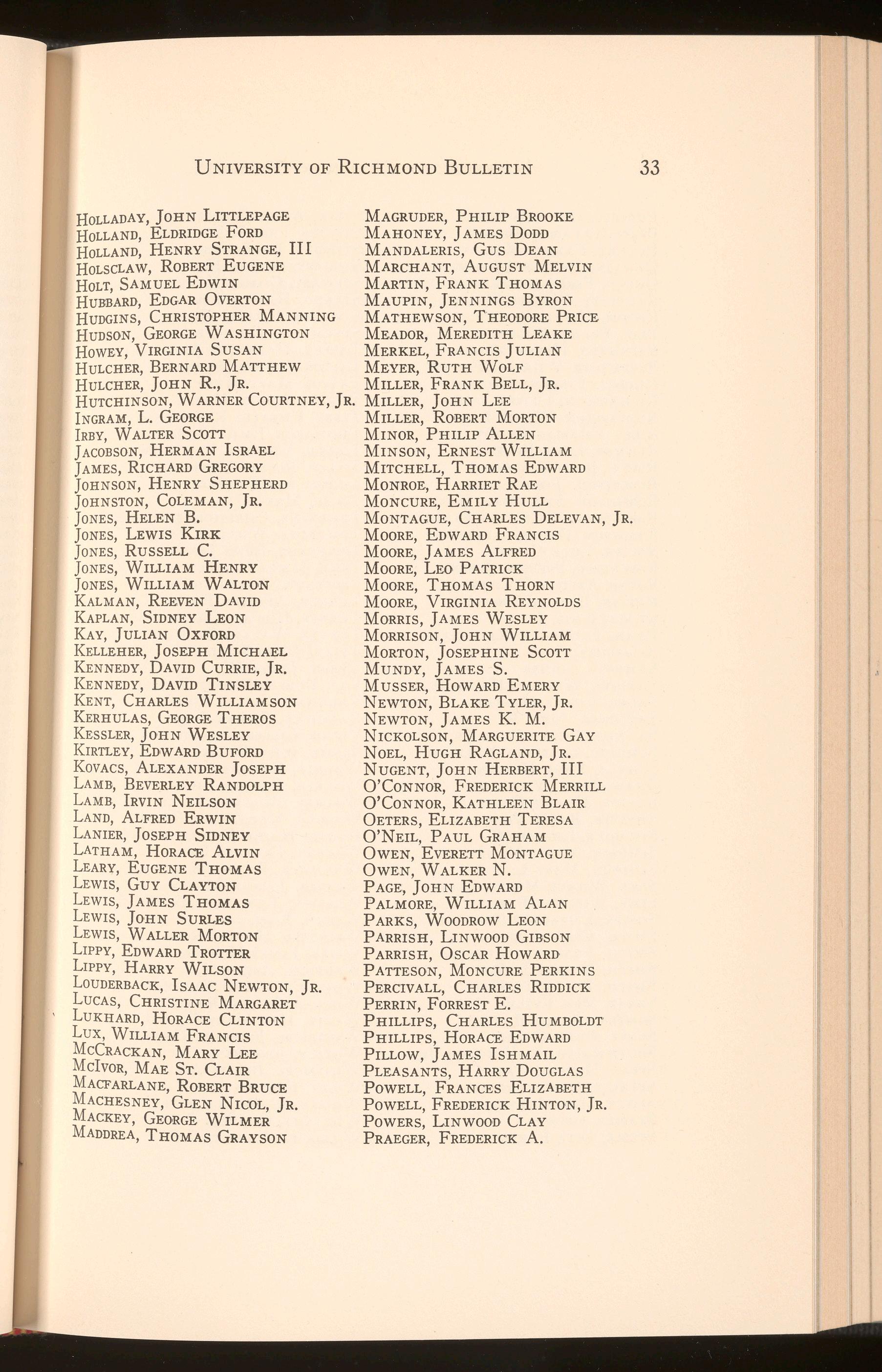
MAGRUDER, PHILIP BROOKE MAHONEY, JAMES DODD MANDALERis, Gus DEAN
MARCHANT, AUGUST MELVIN
MARTIN, FRANK THOMAS
MAUPIN, JENNINGS BYRON MATHEWSON, THEODORE PRICE
MEADOR, MEREDITH LEAKE MERKEL, FRANCIS JULIAN
MEYER, RUTH WOLF
MILLER, FRANK BELL, JR. MILLER, JOHN LEE
MILLER, ROBERT MORTON MINOR, PHILIP ALLEN
MINSON, ERNEST WILLIAM MITCHELL, THOMAS EDWARD MONROE, HARRIET RAE MONCURE, EMILY HULL
MONTAGUE, CHARLES DELEVAN, JR.
MOORE, EDWARD FRANCIS
MOORE, JAMES ALFRED
MOORE, LEO p ATRICK
MOORE, THOMAS THORN
MOORE, VIRGINIA REYNOLDS
MORRIS, JAMES WESLEY
MORRISON, JOHN WILLIAM
MORTON, JOSEPHINE SCOTT
MUNDY, JAMES S.
MUSSER, HOWARD EMERY
NEWTON, BLAKE TYLER, JR.
NEWTON, JAMES K. M.
NICKOLSON, MARGUERITE GAY
NOEL, HUGH RAGLAND, JR.
NUGENT, JOHN HERBERT, III
O'CONNOR, FREDERICK MERRILL
O'CONNOR, KATHLEEN BLAIR
OETERS, ELIZABETH TERESA
O'NEIL, PAUL GRAHAM
OWEN, EVERETT MONTAGUE
OWEN, WALKER N.
PAGE, JOHN EDWARD
PALMORE, WILLIAM ALAN
PARKS, WOODROW LEON
PARRISH, LINWOOD GIBSON
PARRISH, OscAR How ARD
PATTESON, MONCURE PERKINS
PERCIVALL, CHARLES RIDDICK
PERRIN, FORREST E.
PHILLIPS, CHARLES HUMBOLDT ' PHILLIPS, HORACE EDWARD
PILLOW, JAMES IsHMAIL
PLEASANTS, HARRY DOUGLAS
POWELL, FRANCES ELIZABETH
POWELL, FREDERICK HINTON, JR.
POWERS, LINWOOD CLA y PRAEGER, FREDERICK A.
PURCELL, CLIFFORD V.
PRYDE, ELEANOR AGATHA
PUTNEY, FANNIE MAE
QUILLIN, ERNEST ATWOOD
QUINN, FREDERICK ALONZO
RANDLETT, WALTER OSCAR
RECTOR, HELEN LEA
REIF, FRANK WILLIAM
REINHARD, HARRY MEYER
REVERCOMB, WILLIAM ERNEST
RHODES, VINCENT REGINALD
RICHARDSON, OLIVER JAMES
RICHARDSON, WYATT LEE
RILEY, CHARLES ROBERT
RIMMER, LOMA EUGENE
RISON, JOHN WADDELL
ROBERTSON, JOHN LEWIS
ROBERTSON, SYDENHAM BROOKS
ROBERTSON, WILLIAM FRANKLIN
ROBINSON, DANIEL ALPHONSO
ROLLER, LUCY CABELL
ROSENBERG, FREDERIC JosEPH
ROUSE, ARTHUR TOLIVER, JR.
RUFFIN, EDWARD LORRAINE
RUNGE, EMIL, JR.
RYAN, ELIZABETH KATHLEEN
SALISBURY, SAUL
SAMPSON, LOUISE
SANDERS, WILLIAM HUGH, JR.
SAUER, LESTER MARTIN
SAUNDERS, JOHN R.
SAUNIER, PIERRE PAUL, JR.
SCHULTZ, CLARENCE WILLIAM
SCHULZ, PAUL MARTIN
SHAW, JOHN WELLFORD
SHEPPE, HORACE OSCAR
SHETTER, BOOKS POORMAN
SIMMONS, LEONARD G.
SIMPSON, MABEL MUSK
SIMPSON, MARY L.
SIMS, WILBUR MONTGOMERY
SIMS, WILLIAM PARRISH
SLATER, ELIZABETH CORDELIA
SMITH, CECIL ANDREW
SMITH, FRANKLIN CURTIS
SMITH, HORACE DEROY
SMITH, ROCKWELL HALL
SNEAD, MRS. EVELYN BRUCE
SOMERS, GEORGE BRITTON
SONES, RUTH GANN
SOUTHWORTH, R. VINCENT, JR.
SPEAS, HERBERT PARR
SPENCER , GEORGE ALBERT
SPIVEY, MARY LORENA
STAMES, GEORGE
STEELE, DITA EAKIN
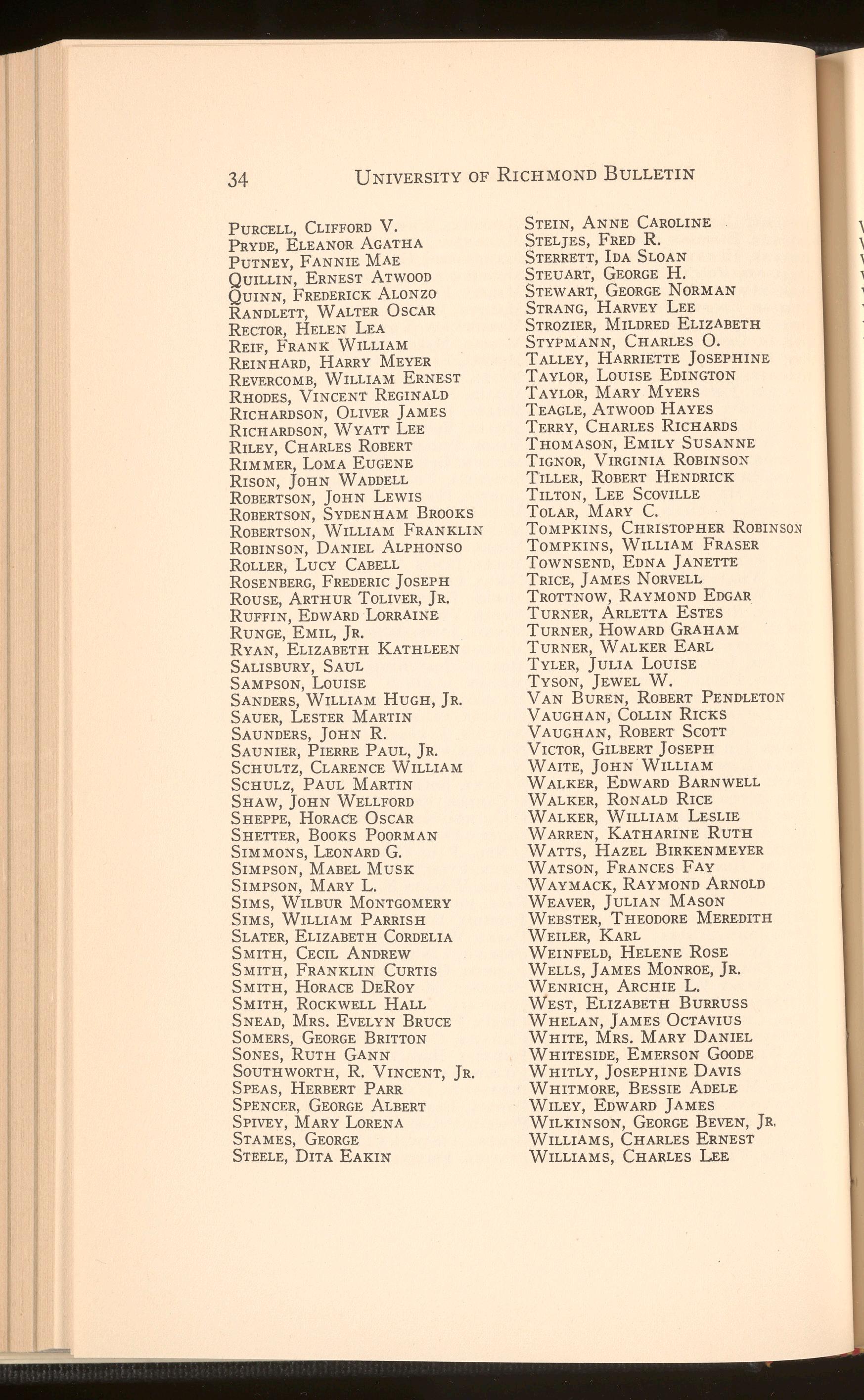
STEIN, ANNE CAROLINE
STELJES, FRED R.
STERRETT, !DA SLOAN
STEUART, GEORGE H.
STEWART, GEORGE NORMAN
STRANG, HARVEY LEE
STROZIER, MILDRED ELIZABETH
STYPMANN, CHARLES 0.
TALLEY, HARRIETTE JOSEPHINE
TAYLOR, LOUISE EDINGTON
TAYLOR, MARY MYERS
TEAGLE, ATWOOD HAYES
TERRY, CHARLES RICHARDS
THOMASON, EMILY SUSANNE
TIGNOR, VIRGINIA ROBINSON
TILLER, ROBERT HENDRICK
TILTON, LEE SCOVILLE
TOLAR, MARY C.
TOMPKINS, CHRISTOPHER ROBIN SON
TOMPKINS, WILLIAM FRASER
TOWNSEND, EDNA JANETTE
TRICE, JAMES NORVELL
TROTTNOW, RAYMOND EDGAR
TURNER, ARLETTA ESTES
TURNER, HOWARD GRAHAM
TURNER, WALKER EARL
TYLER, JULIA LOUISE
TYSON, JEWEL W.
VAN BUREN, ROBERT PENDLETO N
VAUGHAN, COLLIN RICKS
VAUGHAN' ROBERT SCOTT
VICTOR, GILBERT JOSEPH
WAITE, JOHN WILLIAM
w ALKER, Eow ARD BARNWELL
WAL KER, RON ALO RICE
WALKER, WILLIAM LESLIE
WARREN, KATHARINE RUTH
WATTS, HAZEL BIRKENMEYER
WATSON, FRANCES FAY
WAYMACK, RAYMOND ARNOLD
WEAVER, JULIAN MASON
WEBSTER, THEODORE MEREDITH
WEILER, KARL
WEINFELD, HELENE ROSE
WELLS, JAMES MONROE, JR.
WENRICH, ARCHIE L.
WEST, ELIZABETH BURRUSS
WHELAN, JAMES OCTAVIUS
WHITE, MRS. MARY DANIEL
WHITESIDE, EMERSON GOODE
WHITLY, JOSEPHINE DAVIS
WHITMORE, BESSIE ADELE
WILEY, EDWARD JAMES
WILKINSON, GEORGE BEVEN, JR , WILLIAMS, CHARLES ERNEST
WILLIAMS, CHARLES LEE
WILLIAMS, GEORGE ALLEN
WILLIAMS, HATTON LEE
WILLIAMS, LESTER FRANK
WILLIAMSON, WILLIAM GORDON
WILSON, FRANK PATRICK, JR.
WINFIELD, GORDON TELFAIR
Wooo, B. FRANK, JR.
Woon, FLORENCE
Wooo, RussELL KING
WOODSON, FITZHUGH LEE, JR.

WooLFOLK, RoBERT, JR.
WoosT, CARL FREDRIC, JR. WREN, \VoooRow WILSON
WRIGHT, GEORGE DRYDEN
WRIGHT, GEORGE MILTON, JR.
WRIGHT, JOHN WILLIAM, JR. YEAMAN, DORIS GLADYS
YOUNGBLOOD, LEWIS FULTON
ZIEGLER, EMMA J.



